#there are at least three adaptations that try to make mina/dracula a thing
Text
so much has happened in dracula daily lately that I can’t even process it all but holy shit why on earth is mina/jonathan not up there in the ranks of literary romances??? like why is the go-to example a pair of teenagers caught up in shitty politics and not THIS? their love for each other, the lengths they go to for each other, the unflinching support? how has this not seeped into pop culture as surely as the count has?
#and honestly#i don't know if literary people acknowledge it or whatever#and i don't care#there are at least three adaptations that try to make mina/dracula a thing#which is GROSS#dracula is unequivocally a predator in this novel#that should be a thing in pop culture#some characters shouldn't be redeemed#anyway justice for the harkers#one of the greatest literary couples i've seen#dracula daily
272 notes
·
View notes
Text
How I would try to Adapt “Dracula”
Hello, resident Film student that is about to graduate here and I have been through the deep-dive of the Dracula by Bram Stoker waters. Suffice to say, I feel in love and was very disappointed that the cultural osmosis of adaptations that I grew up around to understand Dracula does not even come close to the masterpiece that I found within the original story. It’s Jonathan and Mina, by the way. Their relationship is the masterpiece of this story. Go away very problematic themes, stereotypes, and ideas, I will not let you take this relationship away from me.
Seriously, how was it possible for me to ship a Victorian couple so hard? Why do we not have this in more adaptations?! WHAT IS WRONG WITH YOU HOLLYWOOD?!
…AHEM! Once again, I am sorry to my followers for another fixation has caught my attention. At least this is something I could probably put in a portfolio…
Moving back to my idea, I should make a point that I am a storyboard artist so my idea generally falls to making it into an Adult Cartoon Series. Something along the lines of the Legend of Vox Machina — because I really like that art style and it feels like it fits best with my plot.
Speaking of which, let me get into the plot! Strap in newcomers because I am a bit of a storyteller when it comes to explaining my whacky ideas, if you didn’t already figured that.
DARKY’S DRACULA ADAPTATION, GO!
The setting of my adaptation takes place relatively the same time period. In fact, things are largely the same as the beginning of the novel; Jonathan travels to the Count’s castle, he notices the strong ongoing, he has that horrible encounter with the Vampire Ladies, Dracula does who know what to him, he even has his refined taste for paprika!
You might ask yourself: “Well, how is your adaptation any different from the book?” Well, that’s easy, my good friends. Because Jonathan manages to kill Dracula that day on June 30th, where he successfully decapitates the monster that’s been tormenting him.
It all sounds well and good, right? That means no one to torment Lucy and she can have her big day with Arthur. Mina will be safe, no children get bitten. It sounds wonderful…
…But Jonathan can’t get out of the castle. He remains there, trapped, with the Vampire Ladies and a presence that won’t go away.
Months go by and Mina receives a letter, one from her missing fiancé. He is still in Romania working with the Count, but he would like for Mina to come by and look at the land. Thinking how it would be a wonderful place for a honeymoon.
Mina is confused by the contents of the letter, but it is her proof that her fiancé is alive. And now she has a location of his whereabouts.
With a sadden goodbye to Lucy due to the fact that she will miss her wedding, Mina heads to Transylvania in order to find Jonathan.
But when she arrives at the Castle, welcomed by the Three Women, Mina realizes what horrors had plagued Jonathan and now it will soon come to her.
And that’s the outline of the Pilot I had in my head. Do I think it’s possible for Jonathan to decapitate Dracula with the shovel? Probably not, but it needs to in order for this adaptation to work. And before anyone says, yes, this Adaptation is pretty much Mina Murray going all Resident Evil 7 on Dracula’s castle.
She deserves to have her rage moments. Also, she really wants to get married. If it means she has to storm a castle, then she will do that!
Some other facts that I wanted to include:
Lucy gets more of an active role in the story. She’s been poorly adapted for so long, I wanted to give her something more. She’s the Galinda to Mina’s Elphaba. You bet she’s going to lead a search party that involves her husband, their two best friends, and the silly Professor that was interested in the location in order to find her two childhood friends.
Also, yeah. Lucy and Arthur got married. I’m going to give these two a chance to be happy before things go wrong when they arrive at the castle.
The Vampire Sisters get a chance to be main villains for the first half of the show. Yes, I called them Sisters instead of Brides cause I read that two of the three look like Dracula and I’m just going to leave it at that. Also, I think the Blonde one is their mom? I’m not a hundred percent sure. It’s an adaptation. They’re getting more screen time and depth, is what I’m trying to say!
Mina has a gun, watch out.
Dracula still has a role in this story. That I can include.
I know I likened the plot to Resident Evil 7 so I ‘m just gonna go ahead and say this; Mina will not loose any of her hands.
Expect a lot of Jonmina moments, flashbacks and when they reunite included.
#darky talks#dracula#dracula daily#re: dracula#jonathan harker#mina murray#mina harker#lucy westenra#the brides of dracula#adaptation#A graduating film student talks about her attempt to adapt Dracula#Probably going to start doing test storyboards#I will like to point out that I have no idea what I am doing#All I know is that I want this to take life in some way#If it’s only ever going to be storyboards to be put in portfolio so be it#At least it managed to claw a hand out of the ground#Also hello Dracula fandom I’m new#concept idea#animated series idea#Dracula: Storm the Castle
19 notes
·
View notes
Note
This is going to seem really random, but did you ever watch Phineas and Ferb? Seeing your thoughts on Dracula regarding Lucy, particularly about being vulnerable due to societal expectations, my mind keeps going to Dr Doofenschmirtz trapping Perry in the dining car of a train by using societal conventions.
I have not, so I can't speak to any comparison here (though the mental image of Dracula as Dr Doofenschmirtz is making me cackle). However, I did have this post a couple days ago, which was talking about the same exact thing: how gender politics are actually presented in Dracula, vs. how they are assumed to be presented in both popular adaptations and academic analyses. I have definitely encountered the "Dracula is misogynistic because the Victorians were misogynistic and thus Stoker punishes Lucy and rewards Mina for fulfilling their supposed social roles" take a lot before, but as myself and others are pointing out, that angle.... doesn't really exist in the text? Or at least, while elements of the patriarchical Victorian attitude absolutely do exist, they also don't work, or at least don't work more often than they do. As I noted in the other post, every time the men make decisions for Mina in order to "protect" her, it immediately backfires and they need to include her again, and this happens several times. Likewise, even Van Helsing's well-meant attempt to protect Lucy by not telling her OR Mrs. Westenra (RIP) anything is backfiring, because for all his 800 PhDs, he doesn't talk to anyone! He doesn't trust them to understand what he's doing, his most usual partner (Seward) literally runs an insane asylum, and the tension between "rationality" and "insanity" (or rather, the social fear of being perceived as such) is putting them all in a lot more danger than they have to be!
So yeah. It's not that Victorian social conventions and gender/sexual expectations don't exist in the book; obviously they do. And it's not as if there aren't attitudes and interpretations that reflect Stoker's own social class and position, because there are. But it's been nice to see people realizing that Dracula is both a gothic horror novel and a study of traditional Victorian social behaviors and attitudes in a way that often shows them not working! Jonathan is far too painfully middle-class English to kick up a fuss about escaping Drac's castle, even when he realizes that something's up; Van Helsing won't tell anyone the smallest thing that might help them because he's afraid of being thought Insane; the men try to keep Mina out of things to Protect Her and that backfires; Lucy's ordeal of being constantly attacked and victimized by an obsessive, abusive man is clearly characterized as horrible and not at all a case of Tee Hee Blurred Lines; the three men in love with her are not made into some sort of implication that she's a Slut, and all are applauded by the narrative to do everything they can to help. People not listening to the working-class Romanians get straightaway into trouble, because they're English and therefore automatically assume that they know everything.
Anyway, without getting into too many spoilers for the latter half of the novel, I will say that the reason our heroes are ultimately able to pull together and do something about the Count is because they DISCARD all these not-working social ideas and restrictions. They have to talk to each other, they have to share information freely, they have to include Mina and indeed rely predominantly on her, Van Helsing has to come down off his Only I Can Fix This high horse, etc etc. While they're still trying to follow the rules about how to be a Good Victorian, they're pretty much powerless. It's only when they stop doing that (and act in ways that are held up as more admirable and effective by the narrative) that they finally make progress. And because the novel is so carefully written and plotted, with thematic echoes and parallel narratives often within the same day, I don't want to just say "oh it was an accident, Stoker didn't know what he was doing." I like it because it reflects the point I try often to make, as a historian, that just because you know what the overall rules or collective social conventions were in a certain period, you can't assume that they applied to everyone individually without exception, or that they were never challenged or questioned or internally criticized. So just saying that "Dracula as a novel is obviously misogynistic, the end, because the Victorians were misogynistic, the end" misses the point on a lot of levels, and I'm glad that Tumblr is actually getting this. Seeing as it is, uh. Not really known for doing nuance most of the time.
146 notes
·
View notes
Text
okay hi hello it is Late, i am Tired, and i have Thoughts About Dracula And Misogyny and i’m going to make that your problem
i’ve read a lot of things talking about dracula and women, ranging from the role that women play in the story, how the story demonizes women, and how the story is one big example of bram stoker’s misogyny. and oh my GOD this pisses me off so fucking much
i’m not trying to say bram stoker wasn’t a misogynist. i don’t know him. maybe he hated women. but when it comes to female characters who are written by men, lucy and mina are actually uhhhhh pretty fuckin’ dope. or at least nowhere near as bad as other examples. their voices may be similar, sure, but they’re distinct enough that if you give me two excerpts from dracula, one from lucy’s diary and one from mina’s diary, i would be able to venture a guess with a good amount of confidence. there are tonal differences that suit them as characters, and differences in length that remain consistent to their previous characterization. they aren’t the deepest, most multi-layered female characters to exist ever, but they certainly aren’t noticeably less complex than the male characters. like, when you look at the story, it’s kinda centered around them and the men tend to be referred to as “lucy’s suitors” and “mina’s husband” (and then van helsing, resident wacky mentor)
and i also feel like the way someone talks about lucy westenra is just going to be so revealing as to how they view women and femininity. because the amount of things i’ve read that call her “ditzy” and “shallow” and “oversexualized” are alarming. it just makes me wonder, where are they getting these words from? is it because lucy is characterized as a friendly and likable person? is it because she’s shown to be sensitive? is it because she fulfills the role of the damsel in distress? is it because she gets three proposals in one day?
all of the criticism around lucy being an “icon of misogyny” comes back to the fact that she possesses purely feminine traits. she’s sweet, she’s sensitive, and people like her. she’s not physically strong, she’s not a brainiac, and she can’t fight the vampire off on her own. but why does that make her bad representation? there are real women whose strengths don’t lie in physical ability or academic intelligence, and instead lie in their social skills and the ways that they connect with and care about others
(not to mention the whole “woman gets three proposals in one day = whore” conclusion, which is just wrong on so many goddamn levels)
and like, i’m (not) sorry, but what do you WANT from her? do you want her to stand up to van helsing and yell at him? she’s NINETEEN. he has MULTIPLE DEGREES. she is being REGULARLY MENACED BY A SEVERE GOTHIC THREAT. and nobody knows what the fuck a vampire is! not to mention the fact that i don’t think van helsing would actually listen to her even if she did try to stand up to him, regardless of whether or not she knew what she was talking about!
i just have so many thoughts about her. she deserves better than most interpretations, and it’s insulting how every single adaptation completely fucks her up. jazzy crows, i’m going to bed. goodnight.
#does this make any sense? idk! i’m tired!#long post#dracula#gothic lit#gothic literature#gothic lit musings#lucy westenra#mina harker
131 notes
·
View notes
Note
I’ve seen a lot about your thoughts on Elisabeth and Tanz der Vampire, and they’ve been really helpful getting into those musicals! But you have a huge list of other musicals that people can get into…
So I was wondering if you had any musicals you hadn’t mentioned in a while that you really like or would like to talk about??? (preferably something from your lists that has a blue heart please?)
Oh if only you knew how long the list of European musicals really is... I however have only seen 9 (if I counted right) and I have a lot more that I still need to watch. Oh also, I only put the blue hearts on any musicals that I was providing multiple links for so people could see which version I reccoment the most highly. If a musical only had one link and didn't have a blue heart it doesn't mean I didn't like it.
I've watched: Mozart das Musical, Elisabeth das Musical, Tanz der Vampire, 3 Musketiers, Mozart L'Opéra Rock, Dracula (the Graz production), Rebecca das Musical, Roméo et Juliette and Schikaneder.
If you enjoyed those two you're likely to enjoy Rebecca! It's written by the same composer/lyricist team as Elisabeth and Mozart (and same lyricist as Tanz der Vampire - though if you're listening to any German musical, original or translated, 90% of the time the lyrics will have been done by Michael Kunze that man is everywhere). The Stuttgart production has my favourite set design of any musical! Well... Actually probably. There are so many big set pieces it's insane, way more than I've seen in some Broadway and West End musicals. You can tell so much work went into it and the visual effects that I won't spoil if you don't know the plot but if you know the plot you know what I mean by the effects at the end are so good and I didn't expect them at all and I freaked out so much the first time I watched it. Jan Ammann as Maxim in the Stuttgart production is the best Maxim. No I won't take any argument. Other actors feel a bit one-dimensional to me, but the way Maxim acts at times comes from trauma and some actors and productions seem to forget that, but Jan really goes for it and his Maxim is a lot more sympathetic and I just want to give him a hug. Pia Douwes as Mrs Danvers, if you've seen her in Elisabeth what more do I need to say, she's amazing. A musical goddess. Her Danny is a bit more wild than some, but she kills it. My favourite video, which I put the blue heart next to, has understudy Christina Patten as Ich/I, but I adore her she's my favourite. She adds some spunk to Ich in act 2 and her voice is so pretty and aaaa. I just love these three actors together in these roles.
Roméo et Juliette is another favourite of mine! It's hard to choose which one to recommend, but it has to be the original 2000/2001 production because of the sweetness and chemistry and voices of Damien Sargue and Cecilia Cara as Romeo and Juliet. They're so pretty and work together so well. The only reason I say it's hard to pick is Mercutio. I adore him, but in the original production they cut out a song they had planned for him and he doesn't really do much at all? In the 2010 revival they gave him two more songs and you care about him so much more and John Eyzen plays such a good Mercutio. So I'd recommend the original but if you want to like Mercutio more, which you should he's amazing, I'd recommend watching at least clips of John's. It's an interesting musical because all productions are non-replica and also change around the order of songs, add or take away characters, all sorts. The Hungarian production is also very popular and I'm sure it's great, I just haven't' gotten around to watching it yet.
Mozart das Musical was the first non-English language musicals I watched so I have a fondness for it, but it's not my favourite. However, I do realise I have forgotten most of the songs and the few I've gone back and listened to are better than I remember.
Dracula isn't super popular and I understand why, I don't love the plot of the Dracula/Mina romance in it, however. I do love this musical because despite how I find the plot lacking, the songs are so good! At least, I love them. And the actors are all doing a great job. And it's one of the few Dracula adaptions to keep Quincy Morris so they get bonus points for that.
Mozart L'Opéra Rock and modern French musicals... This isn't necessarily a bad thing, but they're often more like pop-rock operas now. So if you're not into musicals with that style of music it might not be for you, but I still enjoyed it even though I didn't think I would because of the style of music. Mozart and Salieri's chemistry is very good, Salieri's bisexual crisis song is iconic, actually all of Salieri's songs are iconic.
Schikaneder... eh. I didn't like it that much and I didn't really like any of the songs. There's no English subtitles, but someone sent me the entire English synopsis and I watched it with a German friend so I had double the help of understanding it. Doesn't mean others might not like it, just none of the songs stood out to me and I had no desire to listen to any of them again. It's by Steven Scharwz of Wicked fame and I love Wicked, but I didn't love this.
3 Musketiers!! God it's so underrated and not spoken about within the European musical fandom that I even forget about it and literally forgot to write about it earlier in this post. It's a Dutch musical (though did also have a German production) and it's really good!? Faces you might know are Pia Douwes as Milady de Winter, Stanley Burlseon as Cardinal Richeliu (Netherlands Der Tod in Elisabeth), Henk Poort as Athos (Netherlands Phantom and Jean Valjean). The dialgoue is funny, the songs are good, some of the set pieces have no right to exist in this tiny musical?? They made this giant boat and pelt the actors with rain just for one 5 minute song and then we never see the boat again? And while I recommend the Dutch one because Dutch musicals deserve more love and it has official English subtitles!! Official ones, not fanmade! I have the DVD and it comes with English subtitles (and Dutch and German subtitles) which is so nice. The German version is also good, good cast, Pia came back and Uwe Kroger as Richeliu and omg they rearranged the songs and the German arrangement of Nicht Aus Stein is insane and amazing and frankly iconic.
That's all of the ones I have watched. Next on my list to watch are Rudolf and Notre Dame de Paris, both of which I have listened to some songs from and already love (I've listened to way too much of Notre Dame de Paris and am so in love).
I want to start organising streams where I'll host the musical either by getting the video from Youtube or my own files and anyone who wants to join can come along and watch with us, chat with us if you want or just watch there's no pressure to chat. I thought about doing weekly streams? This would also make me finally watch some of the ones I've been meaning to for ages. But I keep wondering about time zones. I'm in the UK and would want to stream at about 11pm at the latest (11pm BST/GMT+1 as we’re in daylight savings at the moment, if the streams continue past the end of October which would be wild then I’ll make a note of the time change that would be to 11pm GMT), which I know can work for other UK and Europeans, but for any Americans would be in the afternoon. So, I wondered if doing it on a weekend would be better? Then it doesn't matter if it's in the afternoon? Maybe Saturday evenings then? It would either be Saturday evenings UK time or Friday evenings UK time. What do you guys think? If people are down then I'll make a separate post with a list of what we'll be watching each week and if anything happens to me that means I can't stream one week then everything will just get pushed back a week, but I don't see that as likely to happen. And I'll only be streaming those that have English subtitles, so don't worry about not being able to understand anything.
edit: am also open to 10pm bst if others want that, im just trying to think of what time works best for everyone so sorry if 11pm is a little late for europeans, i know 10pm could be a little early for americans. also in case it sounded like these are the only musicals i will be streaming, thats not so, ive got more than just the ones mentioned on this list!
(Tagging some people who I know are or might be interested in streams to see what you think of that plan: @sirona-art @ringwraith100 @tanz-der-trash @smilingwoland @the-weird-dane @witchgaye @ami-fidele @kisstheghouls @looking-4-happiness @ladysapphire928 @sloanedestler @tinywound @persephonaae @phoenixdewinter @uwucoffee @freshbloodandgothicism )
#european musicals#mozart das musical#3 musketiers#dracula the musical#retj#romeo et juliette#mozart l'opera rock#mozart l'opéra rock#musical theatre#musicals#broadway#musicaledit#rebecca das musical#rebecca the musical#answeredasks#non english language musicals
55 notes
·
View notes
Text
i watched dracula's curse (2002) and it’s so bad that it’s almost good
Okay, I’m not going to divide it into what was good about this adaptation and what was bad because a lot of it is Good Because Bad (i.e. hilarious), so here’s what I can say about it in general (under read more, since I accidentally wrote a lot):
It’s an Italian-German 2002 TV miniseries and it’s a modern!AU. The events take place in the early 2000′s in Budapest and partly in Romania
The special effects are not even early 00′s cinema, it’s early 00′s TV. Dracula transforming into animals and the way the Brides fly are particularly funny to watch
The acting is... not good. For the most part, the actors can manage when the camera zooms on them, but when there’s a lot of them on screen at the same time, it is often clearly visible that some of them are just. Standing there.
Nevertheless it’s kinda cute??? It has all the characters, and they love each other the way they’re supposed to.
The story begins at some charity gala in Budapest with Jonathan (an American businessman) proposing to his Italian girlfriend Mina, then their friends Lucy, Arthur, and Quincey arrive (Jonathan invited them because he’s been planning the wedding in secret). Seward they all meet for the first time at the gala, and by the end of the evening he’s already roaming the streets hand in hand with the rest of them, drunk and singing. It’s adorable and probably the closest thing to the OT6 That We Deserve I will ever see on screen. I couldn’t take a normal screenshot but just so that you get the vibe:

Here, have a tipsy Lucy smooching a tipsy Mina on the shoulder too:

And then at night Lucy falls when sleepwalking, and all of them (including Seward, who stays the night with these awesome people he just met) fuss over her, and it’s pretty cute too
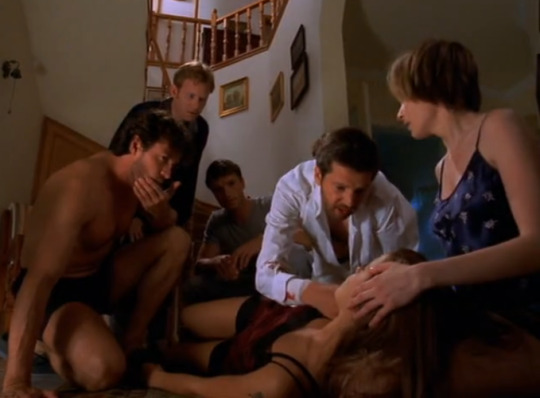
(in case you’re wondering if that’s Quincey wearing the least amount of clothes, of course it’s him)
Van Helsing is an Italian doctor called Enrico Valenzi and he’s kinda hot
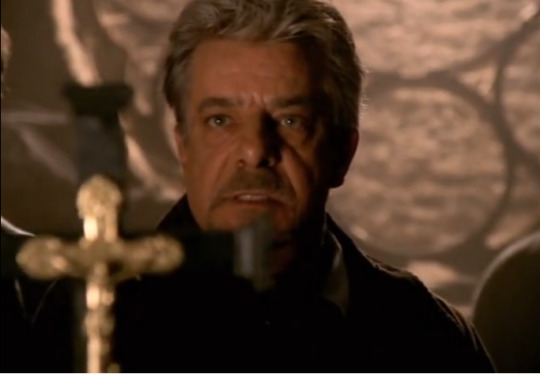
Dracula goes by Mr. Tepes and looks young in Budapest, where he first meets Jonathan and his friends. In Transylvania, he looks old and pretends to be the uncle of Mr. Tepes. He can walk by day, apparently, but he doesn’t show up in the mirror. There’s a scene in which he meets Jonathan and Co. at the opera, stands right in front of a mirror, and none of them notice he has no reflection
When Jonathan arrives at the Romanian border and tells the Romanian guards he’s there to sell real estate to a Romanian citizen, they laugh at him saying that no one in Romania has any money to buy houses, and then aim a gun at him? Okay???
Jonathan’s car breaks and he gets beaten up by some locals for no reason (*venomous sarcasm* nice Eastern European representation! wow!!! *venomous sarcasm over*), and then “uncle Tepes” picks him up in an actual horse-driven carriage. I remind you, this is a modern!AU.
Everything in the “uncle’s” castle looks like it’s still 19th century at least. Jonathan forgets his luggage in the car, so Dracula offers him to pick a change of clothes from the ones available in the guest room, and it’s all, like, frilly shirts and old-time waistcoats and cravattes and top hats
Dracula wears a Bela Lugosi-style black cloak. It’s probably supposed to look menacing, but against the 21st century backgrounds it just looks comical
Lucy isn’t dating any of the suitors at the beginning of the story. She asks Arthur if he would marry her after Dracula starts drinking her blood, because she feels scared for the reasons she cannot understand or explain, and wants to have him by her side, but in the beginning they’re just friends (though it’s made clear that he’s been in love with her for some time). She and Quincey make some sex jokes, but in general they’re just bros (also, when she and Arthur and Quincey arrive at the gala, all three of them dance together, I loved that). She lowkey flirts with Seward when they first meet, but they’re just friends too.
Jonathan and Lucy have some nice friendship moments! During that drunken roaming around Budapest, there’s a moment when Jonathan shows his friends his new car, Lucy jumps in immediately, and they drive around and almost crush it. When Lucy is in the hospital after the first attack, Jonathan, who has already escaped from Dracula’s castle and been to hospital himself, pleads her not to meet with Tepes anymore, begs her forgiveness for introducing her to him, and kisses her on the forehead with tears in his eyes. In general, all friendships are pretty sweet, even though everyone (except for Mina, Van Helsing, and maybe Seward) is a little more of a dick than in the novel.
In particular, Jonathan is a bit of a dick in the beginning, lowkey obsessed with earning more money and stuff, but his Romanian experience makes him evaluate his priorities
Arthur here is a lot like Marius in Les Mis. I won’t elaborate
Quincey’s doing some money swindles and being all “Fuck the law! The most important thing is to get rich!” but he’s not, like, a total bastard, he’s still likeable enough
When Lucy’s dying at the hospital, she briefly regains her human self and asks Van Helsing to keep Arthur safe and give her peace :(
Dracula walks up the wall (not even climbs, just walks up the wall. Gravity? Hasn’t heard of her) on his way to attack Mina, and it looks HILARIOUS
Renfield is there, but he kind of does nothing. We just see him twice talking about his Master, and that is all, it isn’t shown what happens to him afterwards.
The Brides aren’t killed in the end (the only time we see them is when they’re trying to seduce/feast on Jonathan). When Dracula yells at them for touching Jonathan, they huddle together for protection, which is kinda sweet. They look like an early 00′s Russian pop girl band (trust me on that)
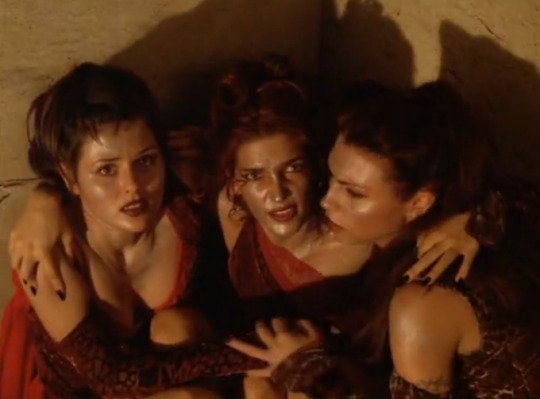
Quincey dies when the men come to Dracula’s house in Budapest to purify the earth in the boxes - he rushes to protect Arthur, and Dracula breaks his neck :(
Have I mentioned that the special effects are Horrible because I just remembered the scene in which a thousand rats come together and turn into Dracula and it looks so damn funny
I loved it that at first Arthur keeps refusing to listen to Van Helsing’s vampire hypotheses, but after Quincey’s death and Mina’s blood baptism, when Van Helsing sinks into despair and thinks that everything is lost, it is Arthur who begs him not to lose hope
Mina is the one to kill Dracula. She hides a stake on herself, and when he comes to her at night and takes her into his arms, she drives it through his heart. At the end of the movie, is is shown that the vampire bite is still on her neck while Ominous Music is playing, so it is left ambiguos if she’s going to become a vampire anyway. I’d say she isn’t, because during the last scenes (Quincey’s funeral), she’s in the church and feels fine there, but then again, Dracula here has a Holy Bible in his library which I don’t think he did in the book, so the vampire lore is all over the place.
In conclusion: a wild ride, very trashy, but also fun and has the same everyone-loves-each-other vibe as the book, so I’m willing to forgive some things.
#i'm not rereading this for typos anymore i am falling asleep#dracula#dracula's curse#bram stoker#gella talks dracula#talk talk talk#this post isn't showing in the tags but w/e
18 notes
·
View notes
Text
FICTIONAL CHARACTER ASK: COUNT DRACULA
TAGGED BY: @superkingofpriderock
Favorite thing about them: How he, at first, starts as a cold and calculating villain, and them slowly, as his apetite for blood becomes more and more strong, he becomes more close to a wild beast, a force of nature that must be eliminated at any cost. Also, specially while doing his affably evil performance at the start of the story, the Count is conscious that he has at least some power, and you can see that he really prides himself of and enjoys this power. Wich makes him even more fun to read and/or watch.
Least favorite thing about them: His image of misunderstood tragic and brooding romantic hero, that has become popular with fans due to more recent theater and movie adaptations.
Three things i have in common with them:
I break mirrors.
Can sometimes be very antissocial.
I don’t supper (just on hollidays).
Three things i don’t have in common with them:
A perfect english.
Money and nobility title.
Magical powers and imortality.
Favorite line: “Listen to them, the children of the night. What music they make”!
brOTP: I don’t think he has any friends. He only wants people around to serve him as his slaves and, later, food.
OTP: He already has three wives, i don’t think he needs more.
nOTP: With Abraham Van Helsing, Jonathan Harker, Mina Murray Harker and Renfielf.
Random Headcanon: Knowing that he was inspired by a Shakespearean actor (Sir Henry Irving), i believe that Count Dracula is a huge fan of Shakespeare’s plays (wich may helped him learn his english), specially Coriolanus, Hamlet, Macbeth and Titus Andronicus.
Unpopular Opinion: I like him better as the classic villain he is in the book, the Bela Lugosi 1931 movie and the Christopher Lee Hammer Horror and Jesus Franco movies, and hope that the next adaptations that will (inevitably due to the book being on public domain) come return to this version of the character, instead of keep trying to make Dracula a tragic brooding romantic hero.
Song i associate with them: Modest Mussorgsky’s operatic version of Night on Bald Mountain
https://www.youtube.com/watch?v=al5aky67VU8
Favorite picture of them:
Shakespearen actor Sir Henry Irving, Bram Stoker’s boss, who was the inspiration for the character of Count Dracula. Stoker actually wanted to turn Dracula into a theater production with Irving in the title role. But for some reason, Irving just ignored the idea. This has become one of the biggest examples of “What could have been” in Pop Culture.

Mas Schrek as his “copyright friendly” german version Count Orlok, from the 1922 movie Nosferatu, directed by F. W. Murnau. Murnau and his team choosed to change his name from Dracula to Orlok in a try to avoid being sued by Stoker’s widow, who at the time held the copyright of the novel. It didn’t worked, she saw the similarities, sued and the judges ordered the film to be destroyed. Thankfully, surviving copies of it were found in the 1960s. Nowadays, both 1922′s Nosferatu and the Dracula novel are on the public domain for everyone to enjoy.
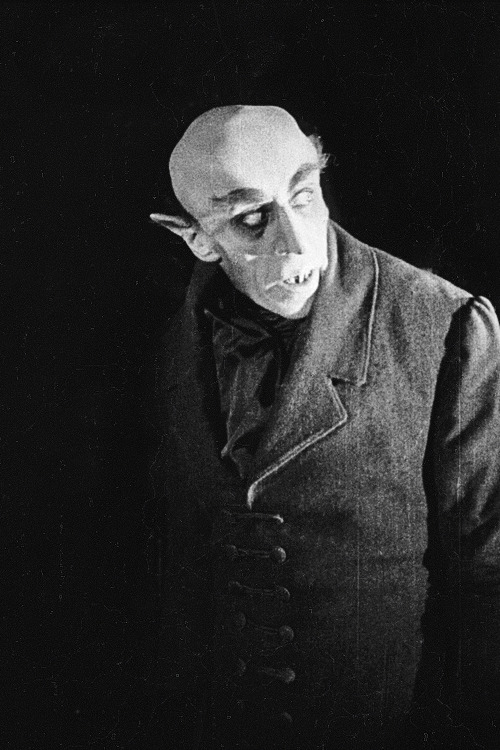
Bela Lugosi posing for the 1927 Broadway production of Hamilton Deane’s Dracula, the first time he portrayed the character that, for better and worst, would define his career. Lugosi would go on to say that playing Dracula was, for him, like playing Hamlet.

Christopher Lee after making another victim in Jesus Franco’s Count Dracula (1970). To this day the only version of the character to have the big mustache mentioned in the book.
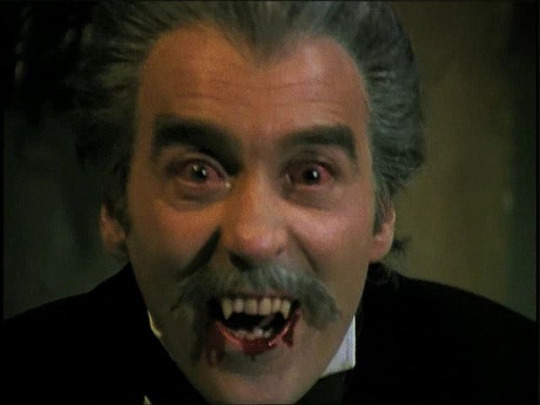
6 notes
·
View notes
Photo

Mirabile Visu
Summary: Sister Agatha Van Helsing discovers she’s in over her head when a competitive game of chess ultimately results in her becoming pregnant with the child of her worst enemy, Count Dracula. Now tied by a bond deeper than blood, the two must learn to coexist and adapt in a world that could be potentially hostile towards their offspring. Parenthood has never looked so batty.
Characters: Dracula/Agatha Van Helsing
Chapters: 9/?
Read on FFN and AO3
A/N: Thank you all for the love and support! This story wouldn't be what it is without you! Feedback is greatly loved and appreciated! Knowing there is an audience for this story keeps me regularly updating it! Stay healthy and safe! -Jen
Chapter Nine
Dracula Residence
Present Time
This was different from the raid on Whitby beach, that much Dracula realized. As he stood there, trying his best to shield his wife from the onslaught, he found it very difficult as the guards formed a circle around them, pressing in so that he couldn't make a tactical move. Suddenly, from the blown in door, a woman stepped inside. She was familiar, her scent immediately assaulting his nasal passage ways. Dr. Bloxham. Ah, the thumbless scientist.
"You know," the woman sighed, looking from Dracula to Agatha. "It didn't have to come down to this. Your flat is rather lovely, it was a shame really."
"If this is about your finger," the count commented. "The nine others aren't completely useless."
"Dracula," his wife hissed quietly. "Don't antagonize…"
"She's right," the woman answered, cutting Agatha off. "I'd be mindful if I were you. I'm sure you've noticed, but there has been quite an adjustment made to our weapons?" She motioned to one of the men, his black uniform masking his features. "Military grade fabric designed to withstand 3,000 PSI bite power. Extra padding around the neck to protect the throat and jugular. Pure silver buckles and," she smiled, pointing to a deep pocket. "Stake holster. But that's not the best part."
Both vampires watched as Bloxham's fingers trailed across the strange device each figure held.
"A crossbow rifle combination," the woman smirked. "Equipped with bullets fashioned similar to stakes with pure silver tips. And," her eyes sparkled maliciously. "Even managed to get them blessed. I must say, the cost was incredible, but thankfully the Foundation has money to spare."
Count Dracula snorted. "I've been shot many times, mortal bullets don't cause us any harm."
"Oh really?" Dr. Bloxham inquired, cocking her head to the side. "Care to wager on that?"
Before either could react, the scientist nodded towards one of the men who pointed the weapon towards Dracula. With a click, he aimed and fired the device, the bullet embedding itself into the count's shoulder.
"Dracula!" Agatha cried out, turning to her husband in horror.
The vampire gripped his arm in pain, trying not to give the doctor the satisfaction of a groan. When he looked to his wound, to his utter surprise, dark red liquid began to trickle down from the entry point. Blood. He was bleeding. And it wasn't immediately healing either. He felt Agatha's hand pressing tightly over his, her eyes wild with concern.
"Detain them," Dr. Bloxham said, turning on her heels. "And if they give you any trouble, shoot them." Her lips curved into a small smile. "Dr. Van Helsing...never trust someone who's emotionally tasked with such a job..."
Zoe Van Helsing’s Residence
The sun had just disappeared below the horizon when Sorina eyes fluttered open. Yawning, she sat up in her bed, blinking back sleep. She was not surprised to see Jack sitting against the wall opposite of her, mindlessly tapping away at his phone-one of his game apps for sure. He'd stayed over after the incident with her parents, Zoe surprisingly allowing it.
"Hey," she smiled tiredly. "Did you get any sleep?"
"Hey yourself," Jack chuckled, putting his cell away. "A little," he admitted. "Zoe gave me a pillow and a throw blanket. At least it was something. Can't exactly complain there."
Sorina sighed, running a hand through her messy hair. "Last night was…"
"Unexpected?" The young man finished. "Look, I know I should've told you about your dad and his...opinion on me, but you just got reunited with your parents and I wanted you to rekindle your relationships before I blew it up."
"If anyone blew up, it was me last night," the halfling stated. "And Mum is pregnant, wasn't expecting that curve ball." She shook her head, glancing at the curtains that still hung over the window. "Where's Zoe anyway?" Not that she really cared. After last night, there had been a long period of silence between them.
"In her room, I think," Jack replied. "Last time I checked she was trying to contact the Foundation. It's strange, she said the phone lines kept sending her to the public voicemail, not to the laboratory itself despite the password. Maybe there's a mishap in the system."
"Could be," Sorina agreed. "I mean, the place is nearly as old as I am. It has its occasional blips." She exhaled, moving to stand up. "Hungry? I was thinking we could order a pizza?"
"Extra pepperoni and bacon?" He smirked, meeting her gaze. "I'll call it in."
"You know me best," Sorina grinned. Pork had, of course, always been a food she gravitated towards. "I'm going to go have a word with Zoe. Hopefully it won't take too long."
Still dressed in her clothes from yesterday, she headed in the direction of her aunt's room. As she drew nearer, Sorina could just make out Zoe cursing softly under her breath. Peering through the slightly ajar door, she watched as the doctor repeatedly typed a series of numbers onto her phone before holding it up to her ear. Seconds passed. Nothing. And the scientist brought the device down to her desk with a sigh.
"Zoe?"
The woman jumped, slightly startled by the sound of her name. Hesitantly, Sorina slipped inside, closing the space between them. Zoe looked tired. More exhausted than usual. Sorina noted a small cut on her bottom lip where the woman must've been chewing on it nervously.
"Sorina," her voice was flat. "You're up." She turned in her chair, now facing the girl head on. "Are we going to have a proper discussion about last night?"
"About how you not only neglected to tell me that my Mum was pregnant, but also the Foundation wanted to 'study' her like some exotic animal?" Sorina nodded towards the phone. "Why are you trying to reach them anyway? To attempt to call things off like some hero?"
"This is a lot deeper than you realize," Zoe sighed heavily. "But yes, I'm trying to handle the situation in favor of your parents. However," she ground her teeth together as she spoke. "No one is taking my calls. Not Bloxham. Not the research facility. No one." Shaking her head, she moved a strand of hair out of her pale face. "I'm sorry, Sorina, what I did was not done with the intention of hurting you."
"If you'd really cared, you'd leave the Foundation for good after this," the young woman exclaimed. "Once my Mum's safety is secured." She paused, noting the gaunt expression on Zoe's face. Anger momentarily melted into concern. "You should've left a long time ago. Have you taken your pills today?"
"They only dull my senses," Zoe stated wearily. "And right now, having a clear mind is needed to figure things out." She glanced at her laptop and her frown deepened. "It's almost like my key card has been cancelled…" It was then her eyes lit up. "Ask Jack to come downstairs, I want to try something."
Sorina studied her aunt curiously for a second, before doing as she requested. Once Jack had joined the two women in the room, Dr. Van Helsing sat up straighter in her seat, expression one of determined nature.
"Call the Foundation," she informed the young man.
"I thought the lines were down?" Jack posed, dialing the number on his own phone. "What makes you think," he continued, now holding it to his ear. "That they'd answer to-"
"Jonathan Harker Foundation," a voice responded on the other line. "Please enter the twelve digit code on the back of your key card to proceed."
The room grew quiet and, though she wasn't sure at the time why, Sorina's blood grew. Jack, looking rather unsure, only continued when Zoe nodded eagerly at him. He typed in his identification number and was immediately redirected.
"Hello," a man answered. "Who am I speaking to?"
"This is Jack Seward," he said with hesitation. "I was wondering if I could reach Dr. Van Helsing?"
"I'm sorry," the person responded. "But the person by that name no longer works for the facility. Have a good day."
With that, the other line hung up. Jack lowered the phone from his ear slowly, his eyes locked on Zoe's. It had been loud enough for all three to hear it. The halfling felt a lump growing in her throat, even her aunt's expression had paled. Something was wrong. Terribly wrong.
"We have to go back to your parents' flat," Zoe said, breaking the silence. "I've made a horrible mistake."
The Jonathan Harker Foundation
The prison situated in the center of the Foundation's research room seemed even smaller than Dracula remembered. The vampire found himself pacing, his shoulder still aching from his injury. It had begun to heal, his body pushing the bullet out within a few hours, but the sting was still there.
Agatha watched nearby, her eyes scanning the room as if trying to figure out some solution that would lead to their escape. At every given corner, a guard stood poised and ready to take action if provoked. One hand rested on her still smooth abdomen, a feeling of helplessness hanging over her. A mother was sworn to protect their child and being trapped here was going against that instinct.
"Bloody Mina Murray," Dracula growled, turning on his heels. "Should've killed her when I had the chance. Why didn't you let me?!"
"We're really going to argue about this now?" Agatha frowned. "About me saving the life of an innocent woman during a massacre you caused?"
"Well look where it brought up!" The other vampire gestured around. "She had to go and created this ridiculous little institution of hers."
"Well if I hadn't," the woman countered. "You wouldn't have me, Sorina, or…" her voice trailed off as her eyes flickered down to her stomach. The count seemed to sense her worry and moved to her side.
"I won't let any happen," he promised, placing his hand over hers. "To either of you."
"It's funny," she smiled weakly. "You said to me once all those years ago that I can't save everyone and yet here you are, proclaiming the same thing."
"Perhaps you unfortunately rubbed off on me," he smirked. "You do have a way of doing that."
"Must be the inner nun in me," she chuckled, leaning into him. "To think a game of simple chess led us this far."
"Remind me to burn the game when we escape," he replied.
"Not after I challenge you to another round," she countered, the mood beginning to lighten. "I…"
The former nun's words were cut short as the heavy metal sliding doors opened and Dr. Bloxham strode in. She seemed to study the two vampires, expression void of any emotion as she approached, two men at either side. In her hands, she clutched a clipboard, her focus shifting to whatever paperwork was attached to it.
"It's rather unfortunate that I never got a proper examination of your daughter," the woman commented. "Based on the relationship between the Van Helsings and the Murrays, it was declared that she was off limits. A pity, I would have loved to learn what made her tick." A low growl escaped from deep within Dracula's chest and the doctor smirked. "Did I hit a pressure point?"
"For a place that relies so much on Christian faith, you sure lack the understanding of it," Agatha answered bitterly. "Forgiveness, Kindness, Humility…"
"I don't take preaching from a fallen nun," the woman countered. "As for my beliefs on God, they pertain solely on the idea of how to destroy a monster such as yourselves." She paused, amused by Agatha's threatening glare. "I will say, I am quite curious though as to what's inside you. I may have missed out on your daughter, but your second child and its development. I think I'd like to have a better look at that."
Dracula nudged Agatha behind him as the armed men began to circle around in close proximity to the prison's frame.
"Restrain him," Bloxham said simply. "I'm only interested in her."
Dracula Residence
Sorina was the first to leap out of the car and bound towards her parents' home. She could hear Jack calling out, his footfall far behind hers. There was something off. She could sense it. And as she rounded the corner, her heart immediately sank at the sight.
"No," she whispered. "No, no, no!"
The damage was done. The door blown right opened, wood splinters. She could smell it. The scent of blood. And it was not human. Zoe and Jack stood behind her, both humans panting as they too took in the sight.
"Sorina," Zoe said breathlessly, reaching out for her niece. "I…"
"You!" She snapped, turning to face the scientist. "This is your fault!"
"I didn't know this would happen," she replied, pain laced in her tone. "I didn't…"
"I don't care," Sorina muttered. "About you or about the Foundation. I'm going to get my parents back alone or otherwise."
Her eyes had grown dark, and for the first time since he'd known her, Jack felt afraid of her.
"They just fucked with the wrong family..."
14 notes
·
View notes
Text
Howcumzit?: Dracula
How come the show never followed up on the idea that Jonathan Harker had fucked Dracula?
They pretty much opened the show by bringing up the idea, after all, which lent an unpleasantly '80s frisson to Jonathan's emaciated appearance - one thinks of Garth Marenghi's Darkplace, and that immortal line "the cosmic spores, of course, represented AIDS". But then Jonathan's interactions with the Count end up playing out, if not exactly like the novel, then more or less played straight - you'll pardon the pun, I'm sure.
Dracula does of course go on to gin up sexual tension with pretty much everyone else he meets, no matter their gender or religious leaning, but what makes it particularly surprising here is that in the first episode he's actively becoming sexier in every scene. Yet even when Jonathan is completely in his power, it all seems quite innocent and chaste. Perhaps those aren't quite the right words for being held captive, but nonetheless it doesn't seem to have any particular undercurrent of sauciness.
Stephen Moffatt has been quoted as saying that rather than bisexual, this incarnation of Dracula is "bi-homicidal...he's killing people, not dating them". Which would seem to put a pin in the thrust of my complaint here, until you recall - as Moffatt really should have - that the show ended with Dracula banging Van Helsing.
_
How come Gatiss and Moffat couldn't resist slipping in that painfully clunky reference to Sherlock Holmes? And by Sherlock Holmes, what they really mean is their BAFTA-award winning series Sherlock®.
What makes it so obviously shoehorned in is the much better reference to 'Inside No. 9' in the following episode. Inside No. 9 is of course the comedy-horror anthology series made by the non-Mark Gatiss parts of the League of Gentlemen, which has, so far, not needed nearly as many frantic, flailing fan interpretations to make its plots make sense.
_
How come Dracula's meant to pick up traits from the people he feeds on, but doesn't start speaking in Sister Agatha's silly Dutch accent?
_
How come in episode two, the little mute girl didn't immediately tell her dad that Dracula was the killer?
This is more a straightforward plot hole than a wider point of pondering, but it's one that will probably occur to even the most casual viewer. The show's clearly hoping there's enough other stuff going on that nobody will notice, which is obviously a misstep when what's going on all revolves around there being a killer at large.
Now, there's an obvious fan interpretation to be made here that the little girl - angry with the world - simply wanted to see them all die horribly. I'd watch that, and so, I suspect, would most right-thinking people. It would certainly have made for a better episode three than the one we got.
_
How come the snobby twink's boyfriend spends most of the time resenting the guy's sham marriage, then doesn't seem to care when Dracula feels him up in front of everyone? Come to think of it, why doesn't anybody else care about that?
_
How come Gatiss and Moffat couldn't resist leaping into a contemporary setting?
And why, if they wanted to do it so much, did they have to do it so poorly? Thanks to some confusing editing and omissions, it came off looking like Dracula had been struggling along the sea bed for 123 years.
This is a recurring feature of their work - Sherlock, too, was taking a classic bit of Victoriana and transplanting it into the modern day. The Sherlock Christmas special, though, did put it in its natural setting, which if nothing else worked as a fun, campy thing - and that, despite what Gatfat might think their work is, is the tone that runs right through it like a stick of Brighton rock.
Episode two took a part of Stoker's book, stitched it onto a familiar Murder On The Orient Express-style setup, and then turned Claes Bang's Dracula loose to bounce around in that framework - and it worked beautifully. This could have been a winning formula for any number more episodes, but instead they pissed it all away in favour of a tired Hollyoaks-style relationship drama and a secret institute which definitely isn't Torchwood.
_
How come modern-day Van Helsing didn't have the same silly Dutch accent?
Just to harp on a point, this makes the problem with the time jump quite clear. Van Helsing is pretty much the same character even before they literally inject the original Van Helsing into her - which makes it seem oddly like the sexual tension between her and the Count was somehow heritable. And having already demanded that willing suspension of disbelief, why not go the whole hog, and have Jonathan and Mina's identical great-great-great-descendants turn up too?
_
How come they thought putting a bit of off-coloured prosthetic on the incredibly attractive Lydia West would put anyone off?
The TV and film industry in general has an issue with this, fumbling to present unattractive people while staunchly refusing to even think about casting anyone less than conventionally beautiful. Dracula, however, had already presented some suitably ghastly ghouls, and here went through an overlong sequence of coyly refusing to show us what the post-cremation Lucy Westenra looked like - then the shocking reveal was that, uh-oh, she's got a bit of latex on her face. I'm a man of the world and let me tell you, it would take more than that to change my mind.
_
How come Mark Gatiss didn't stay behind the camera where he belongs?
This isn't to say he's a bad actor, but if he wanted to do Renfield, he should have done it properly. A show that's already had Dracula dressing up in another guy's face before tearing it off (for my money, one of the funniest things on TV in some time) doesn't need wacky comic relief.
_
How come everything about the conclusion?
Okay, that may be a little vague. Let me rephrase it to at least be making a point, rather than inarticulately shaking my fist in the general direction of the TV screen - why'd they even need to have a conclusion?
Gatiss and Moffat are not good at overarching storylines, yet they will keep using them, and I simply don't understand why. The appeal of Sherlock Holmes is to see the guy solving mysteries - so Sherlock had the mysteries take a back seat in favour of examining the ever-more-complicated relationships of the Holmes family.
The last five minutes or so of Dracula's third episode crumble when exposed to the light, which is ironic, because this Dracula doesn't. Given any thought at all, it's clear that the inspiration here was that Gatiss/Moffat thought 'oh shit, we need to wrap this up'. It tries gamely to tie everything together, which is somewhat undermined by at least one dangling plot thread - which the writers have openly admitted was left there in the hopes of getting a second season.
Bram Stoker's novel, spoiler alert, ends with the Count getting staked - but this adaptation went off those rails long ago. The central charm of it is the battle of wits between Dracula and Van Helsing, seeing them try and one-up each other while trading sexually charged barbs in much the same way as Sherlock and Moriarty (or at least the Sherlock and Moriarty that Gatfat gave us). This is a dynamic which could carry on indefinitely, and would have done better if it had, rather than been sidetracked into an unnatural-seeming ending.
16 notes
·
View notes
Text
“DRACULA”: BOOK vs. MOVIES
Part 5: The Final Battle & The Death Of Dracula
Welcome to the fifth and final part of my essay comparing Bram Stoker’s novel “Dracula” to those film versions most commonly referred to as those “faithful to the novel.” To understand why I wrote this please check out parts one through four.
BUT FIRST...
As before this essay is NOT spoiler free. And whether you love or hate any of the films being compared here is beside the point and a subject best left to posts dedicated to film critique. This essay is SOLELY about which films are the most faithful to the novel... period.
And one final reminder of those versions most touted as “faithful” that I compared:
“Nosferatu: a Symphony of Horror” (1922) aka “Max Schreck Version”.
“Count Dracula” (1970) aka “Christopher Lee Version”.
“Bram Stoker’s Dracula” (1973) retitled “Dan Curtis’ Dracula” aka “Jack Palance Version”.
“Count Dracula” (1977) aka “Louis Jordan version.”
“Bram Stoker’s Dracula” (1992) aka “Coppola version”.
And now...
PART FIVE: THE FINAL BATTLE & THE DEATH OF DRACULA
Stoker’s novel ends with a rip-roaring chase through Transylvania’s Borgo Pass as Dracula’s Gypsy minions try to spirit the Count away in a large wooden crate mounted on a horse drawn cart. As the sun has not yet set, Dracula is still in a weakened state, thus the Gypsies are desperate to get the Count to the relative safety of Castle Dracula. However, the vampire hunters - Johnathan Harker, Quincey Morris, Dr. Seward and Arthur Homewood - are in hot pursuit on horseback with an assortment of bladed weapons and Winchester rifles. Already at the castle are Mina and an exhausted Van Helsing.
Seeing the approaching Gypsies, Mina arms herself with a pistol. As she is in the growing thrall of dark supernatural power she marvels over the fact that she feels no fear whatsoever over the coming battle she is about to join.
When the Gypsies reach the castle the final battle rages with gunfire and flashing blades. Soon the Gypsies are either dead or on the run but not before Quincey Morris is mortally stabbed.
In a state of mania, Johnathan Harker leaps onto the Gypsy cart and heaves the crate containing Dracula to the ground, then Harker and Quincey rip open the lid just as the sun sets. Dracula’s eyes glow red with triumph as his powers are restored but he’s too late as Harker slashes the Count’s throat with a vicious swipe of his blade, followed instantly by Quincey Morris who, in a final dying act, drives his Bowie knife into Dracula’s heart, which instantly turns the vampire king to dust.
Surrounded by his fellow vampire hunters the Cowboy Quincey Morris lies dying in Johnathan Harker’s arms. His final words are a quiet declaration that he willing dies in the service of saving the life and soul of such a valiant woman as Mina.
Almost every telling of “Dracula” has a more stage-production-inspired traditional ending, usually involving a final confrontation between Van Helsing and the Count, with the Professor delivering the death blow... even four of the five “faithful” versions I’ve listed here. The Count is killed by sunlight in one. He’s staked through the heart by Van Helsing in two others (one with a wooden stake, one with a wooden spear). And one uniquely ends with Harker and Quincey setting Dracula’s casket on fire in broad daylight so the Count cannot escape.
And while no film presents Stoker’s action ending with 100% accuracy, three of the films do make the attempt with varying degrees of faithfulness. I will take each one in order of accuracy.
Christopher Lee Version:
In the Lee Version there is no chase and no battle with guns and blades. The Gypsies just show up at Castle Dracula with the box containing the Count in what looks like a funeral procession. Johnathan Harker and Arthur Homewood... excuse me, Quincey Morris are lying in wait - and that’s it... no supernaturally powered Mina, no exhausted Van Helsing and no vengeance hungering Doctor Seward... it’s just Harker and Morris. The two lone heroes then “battle” the Gypsies by simply dropping huge square chunks of castle wall on them until the Gypsies run away. The rest of the action does not follow the novel at all. So, this finale is only kinda-sorta faithful but at least there was still a confrontation of sorts with the Gypsy minions so... that’s something anyway.
Louis Jordan version:
On the other hand the Louis Jordan version is the very first adaptation to include both the raucous chase and the battle with guns and blades. However composite character Quincey Homewood is shot and wounded instead of mortally stabbed. When he gets to Dracula’s cart he collapses unable to do more, so he has no hand in killing Dracula. Doctor Seward is present and fights. Van Helsing and Mina are also there but Mina is not driven by supernatural power that makes her bold and fearless and she only wields a gun because Van Helsing gives her a rifle and tells her to use it. Though to her credit she does use it once to kill a Gypsy who is about to stab Harker. The rest of the climax does not follow the novel but until now this was the closest any film had ever come to what Stoker wrote. So kudos to them!
Coppola Version:
Coppola’s also has the mad chase and battle with guns and blades. Johnathan Harker, Doctor Seward, Arthur Homewood, and Quincey Morris are all there and fight valiantly exactly like in the novel. And like the novel an exhausted Van Helsing and Mina are also present with Mina possessed by supernatural power that drives her to fearlessness. Though unlike the novel the supernatural power drives Mina to defend Dracula with a gun rather than use the gun against Dracula’s minions - which when you think about it kinda makes more sense as it’s a dark power that is gripping her soul.
But then like the novel Quincey is stabbed, Harker faces Dracula just as the sun sets and cuts the vampire’s throat and in a final dying act Quincey drives his Bowie knife into Dracula’s heart. Coppola deviates from the novel at this point in that Dracula does not die immediately and burst into ashes and Quincey Morris dies in Doctor Seward’s arms and not Johnathan’s as written. But I rather liked that particular deviation as Doctor Seward and Quincey Morris were both failed suitors of Lucy Westenra and driven by vengeance, so I found it fitting that one heartbroken suitor dies in the arms of the other heartbroken suitor.
In the end, all of this makes Coppola’s the only “Dracula” film ever made to not only include all the combatants from the novel, the heroic dying deeds of the American Cowboy, and most amazingly of all, the first and ONLY “Dracula” film to show the precise mechanism of Dracula’s death by way of a slashed throat and a cowboy’s Bowie knife through the heart just as Stoker wrote it.
Sure, ultimately in Coppola’s version it is Mina who eventually drives the Bowie knife home to end the Count, but I have ZERO problem with this embellishment. Purists may get upset, but after decades of Mina being reduced to “Damsel in distress” I say why not let the stout-hearted woman finally be the one to destroy the Count.
Winner: Coppola version
AND THE ULTIMATE WINNER IS...
After 5 days worth of essay, in the end it turns out to be pretty obvious that it all comes down to two... the Louis Jordan version and the Coppola version. As to which is the most faithful to Stoker’s work is up to you as it depends on what is most important to you as viewer and reader.
If it is historical accuracy and strict adherence to Stoker’s plot and overall authentic period tone then Coppola’s version is disqualified for the way it more or less bullet-points the plot to make room for the added subplots, its gothic dream-like tone, and all those wild embellishments this film so gleefully revels in. Thus the Louis Jordan version is the hands-down winner. No question.
However, if adherence to Stoker’s characters is more important to you then one can only favor the Coppola version. What with it’s more accurate depictions of Johnathan Harker, Dr. Seward, Arthur Homewood and Van Helsing. Being the ONLY filmed version to include the complete story of the American Cowboy Quincey Morris. And of course a portrayal of Mina that finally gives her a true arc worthy of the bold character Stoker had written. Add to that the most faithful rendition of the final battle yet filmed and the only film EVER to include the novel-accurate killing blows to Dracula and my personal choice is Coppola’s.
But that’s just me, the ultimate choice...
...is yours.
AFTERTHOUGHT
Two things:
First, here is a novel written in 1897 that ends with a raucous chase, a gun battle featuring Winchester rifles, a fearless heroine wielding a pistol and a Cowboy from Texas who kills the King of the Vampires with a Bowie knife. Frankly, I find it astounding that in the 1930’s, 40’s and 50’, jingoistic Hollywood didn’t crank out a slew of Dracula films that focused mainly on those elements, with brave American Quincey Morris as the central figure. You would think as kids we would have all grown up believing the story of “Dracula” was about a noble Gary Cooper-esque Cowboy vampire hunter vs. the Prince of Darkness. Only to then someday read the book and be shocked that Quincey Morris wasn’t the main hero.
And finally, regarding future cinematic tellings of “Dracula”... sure, the Jordan version sacrificed characters for plot and the Coppola version sacrificed plot for characters so there’s still plenty of room for someone to finally make the definitive faithful version... but, if I’m to be completely honest I am far less interested in that as I am in a version told entirely from valiant Mina’s point of view. Dracula vs. Van Helsing has been done time and time again on stage, film and television. In fact, they just did it again on Netflix. It’s time for a true MINA vs. Dracula movie. Such a film is more than 100 years overdue... and I would love to see it.
To all of you who read some or all of this essay, I say thank you. I hope you enjoyed it or at the very least found it to be a nice diversion. I truly wish I could invite you all over for a “Dracula” movie marathon. For I would then quote the Count:
“Welcome to my house... come freely, go safely, and leave something of the happiness you bring.”

3 notes
·
View notes
Text
Dracula (2020)
(spoilers)
I’m kinda sad that I didn’t watch this one with one with a bingo chart or a drinking game. Even with all of its plot mutations and character updates, Netflix’s Dracula (2020) is pretty much exactly what I expected from a Mark Gatiss & Steven Moffat take on the classic source material: a self-congratulatory, over-produced adaptation obsessed with its own “cleverness” and with its overbearing main character, sprinkled with juuuust enough moments of genuine innovation to make it really sting when it all amounts to a big dud.
If you have seen Jekyll, Sherlock, and the worst of Moffat’s Doctor Who episodes, you know exactly what I mean. If you don’t, I refer you to this entertaining and ridiculously long video essay (that absolutely merits every second of its 1 h 49 min runtime) by YouTuber hbomberguy: https://youtu.be/LkoGBOs5ecM; even though I don’t completely agree with all of his points, he does make a strong, multifaceted argument on why, despite his admitted talent, Moffat’s writing usually ends up sucking hard.
Anyway. I think the first episode of the three-part Dracula series does make some kind of case for itself. It sets a distinctive mood, includes some pretty solid performances, tells a coherent story, and introduces some truly impressive and creepy horror imagery. I also enjoyed the inclusion of Sister Agatha - even though her being revealed as the Van Helsing of this version is definitely one of those Gatiss & Moffat moments that the writers thought would be much more of oooooh moment than it actually ended up being - who did serve as a formidable opponent for Dracula for the first two episodes. As I said, Moffat tends to anchor his stories to an overbearing lead around whom all other characters revolve, and while that’s is definitely the case here as well, Sister Agatha does stir up the dynamics by refusing to dance to his tune.
Still, the writing is also riddled with the usual Moffat plagues, which stay mostly at bay in episode 1 but end up becoming more of an issue in the second episode. The second episode, which fully takes place on the doomed ship Demeter’s journey to Britain (which I believe has been the subject of a horror film script that has been stuck in Hollywood’s development hell for years and years - I wonder if it’ll ever get made now that the story concept was basically executed here?), is overlong, and it’s weighed down by an unnecessary framing device that develops into an unsurprising plot twist, and by the general lack of interest in creating emotional investment in any other character besides the two leads. Just like the ship, the story drifts in the fog for ages but almost makes it to shore in one piece, only to be sunken down by the most stupid thing I’ve watched in a very long time: episode three.
Yikes.
I do my best to give credit when credit is due and point of the merits of things I overall disliked, but I honestly can’t say that there was anything in the finale that I liked. It’s a mess, and not even a hot one. It’s more like they dug up the long-dead remains of Jekyll, carved out the most awful bits, reheated them, and then left them out to cool down again. I could go on and point out every little thing I found exasperating about the episode, from the regrettable time jump to the lack of thematic focus, to Van Helsing going on and on about the “illogical” nature of Dracula’s weaknesses like it’s remotely interesting, to the clumsy narrative structure that picks up and abandons plot threads like it’s an indecisive customer in a thrift shop, to Zoe Van Helsing becoming just another addition to Moffat’s long line of seemingly “strong” female characters who are rendered basically powerless by the overwhelming charms of the male lead, and all the way to what must be my least favourite horror trope - a paramilitary, pseudo-scientific secret organization set on capturing and studying monsters (seriously, can we please retire this unexciting trope that has never once improved any horror property?) - but for now I’m only going to address the one that made me groan the hardest: Lucy.
If you are at all familiar with the novel or any of its numerous adaptations, you might also be aware of the conversation around Lucy and Mina, the novel’s two female characters who both embody Victorian ideas about women and sexuality. A popular reading is that Lucy, the flirty little minx with various suitors who ends up being seduced and corrupted by Dracula, is the whore to Mina’s virgin, which reflects the narrow, black-and-white, judgmental attitudes towards women who stray from the Victorian ideal of the virtuous, demure woman with no appetite for sex or male attention outside marriage. In that sense, the 2020 incarnation of Lucy is a faithful adaptation of the character from the book. And that’s precisely the problem! Just because Bram Stoker’s book is sexist, it doesn’t mean that this version should be that as well. But it is, and oh god I hate it so much.
Gatiss & Moffat’s Lucy is a glittery, uncaring thot who takes selfies and DMs strange men, because of course she is; shaming young women for liking sex, being beautiful, and enjoying attention is exactly the sort of thing men who cannot relate to women do when they’re trying to be insightful. And as if that wasn’t enough, they also give Lucy “depth” by making her resent her beauty in some way that remains woefully unexplored, because heaven forbid pretty girls should have any thoughts inside their head that aren’t directly related to being pretty. Even the shallow, dark edge they give to the character fails to bring her any sense of complexity and humanity, and she ends up being just a beautiful creature for men to gaze at in both adoration and condemnation. A beautiful creature who must ultimately be cruelly punished for the sin of being lovely and untameable. How’s that for some Victorian bullshit?
More than anything, Dracula reads like a revue of Gatiss & Moffat’s (particularly Moffat’s) greatest and most recurring grievances as writers: a self-defeating attempt at outwitting the audience with “surprising” plot twists hammered awkwardly into the story at the cost of anything that might have made it good, ambitious world-building ideas left to die as soon as they’ve been introduced, an overreliance on a scene-chewing, dickish male lead character who’s supposed to be bad but, like, in a fuckable way, pointless queer-baiting that is guaranteed to elicit frustrated screams from certain parts of the internet, and terribly written female characters with inner worlds conceived by a middle-aged man who is evidently unable to imagine a woman whose every thought isn’t motivated by uncontrollable lust for aforementioned dickish male lead. Jesus.
1 note
·
View note
Text
Film Allusions in Crimson Peak
Hi, all! So because I am deep in my horror movie feels at present and, as horror is a genre that some of you are new to/unfamiliar with, want you all to have some more context for Crimson Peak as an intertextual Gothic pastiche, I thought make a little list of films (mostly horror) that CP references, alludes to, or visually echoes (other than Jane Eyre or any iteration of “Bluebeard,” that is). This list is certainly not exhaustive, but I hope will give you a starting place at understanding the scale of the intertextual web this movie is weaving (also maybe give you some movie recs if you’re into horror/classic cinema. I’ll try to include links to films in the public domain).

Nosferatu (1922) and other early 20th century cinema
Del Toro makes use of a lot of the aesthetics and techniques of film from the late Victorian period/early 20th century (appropriate since Crimson Peak is set in the 1890s - incidentally one of the peaks of Gothic literature). One of these is iris shots/iris transitions (shown above in this screenshot from Nosferatu). Iris transitions are when a circular black mask over the shot shrinks, closing the picture to a black screen (very common in early horror film and 1920s cartoons, ie Betty Boop). If you’d like some very iconic, silent vampire cinema, you can watch Nosferatu here at archive.org for free.
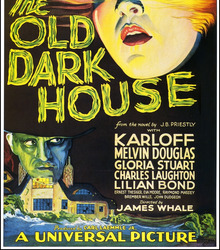
The Old Dark House (1932) | Watch free on Archive.org
Seeking shelter from a storm, five travelers are in for a bizarre and terrifying night when they stumble upon the Femm family estate.
A trope codifier for the haunted house movie, complete with oodles of Gothic weirdness, including those ooky spooky, co-dependent Femm siblings.
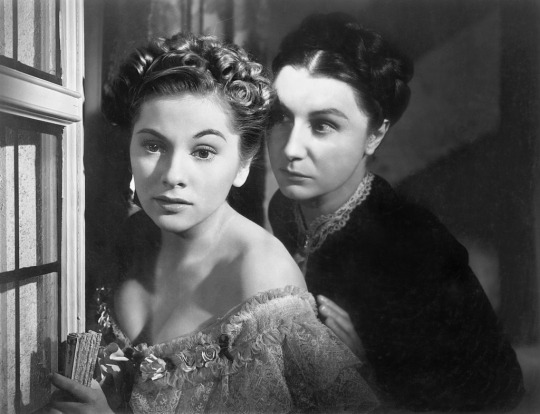
Rebecca (1940) | Watch free on Archive.org
A self-conscious bride is tormented by the memory of her husband's dead first wife.
Based on Daphne Du Maurier’s novel of the same name (itself heavily based on Jane Eyre), this Gothic variation on “Bluebeard” was Alfred Hitchcock’s first American film, won two Academy Awards, and is still considered one of the best psychological thrillers of all time. Features an overbearing female figure who directly interferes with our protagonist’s marriage to her, er, Prince Charming in the form of a Sapphic housekeeper obsessed with keeping the memory of the first Mrs. De Winter alive.

Notorious (1946) | Watch free on Youtube
A woman is asked to spy on a group of Nazi friends in South America. How far will she have to go to ingratiate herself with them?
Don’t drink the tea! Also, butterfly-backed chairs. Allll the butterfly-backed chairs.
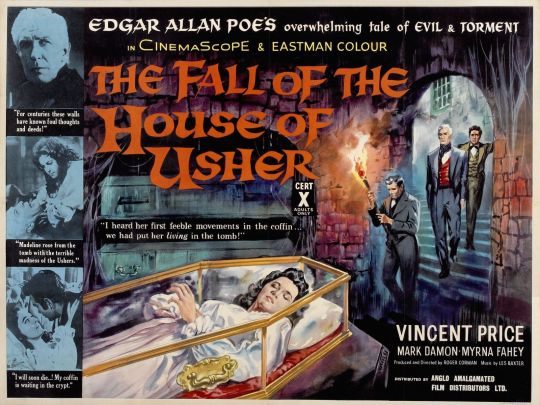
The Fall of the House of Usher (1960)
Upon entering his fiancée's family mansion, a man discovers a savage family curse and fears that his future brother-in-law has entombed his bride-to-be prematurely.
Two prongs here: Crimson Peak is very much playing with Edgar Allan Poe’s short story (incest siblings! Gothic manors sinking into the earth!) and evoking a particular aesthetic associated with a number of 1960s/70s “schlock” Gothic horror films like those made by Roger Corman who applied his use of vivid color and psychedelic surrealism to a number of Poe’s works.
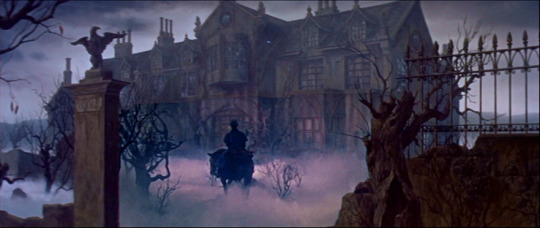
AESTHETIC!!!!! Speaking of aesthetic excess...
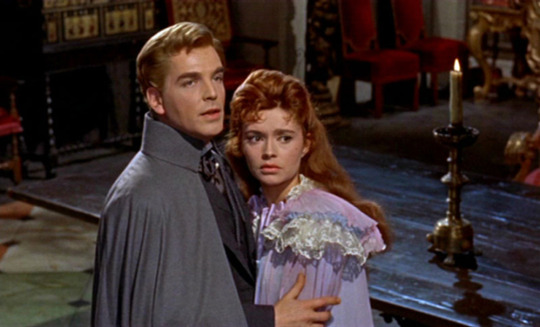
The Brides of Dracula (1960) and other Hammer Horror films
Vampire hunter Van Helsing returns to Transylvania to destroy handsome bloodsucker Baron Meinster, who has designs on beautiful young schoolteacher Marianne.
Known for a series of Gothic horror films made during the 1950s - 1970s featuring well-known characters like Count Dracula, Baron Frankenstein, and The Mummy, Hammer film productions hooked audiences with its use of vivid color, gore, sexy damsels in nightgowns, sexy women with fangs, sexy mummy girls, sexy... you get the idea. It left an indelible aesthetic mark on horror cinema since (including Crimson Peak). Also famous for catapulting the careers of Christopher Lee and Peter Cushing or, as you might know them, Count Dooku and Grand Admiral Tarkin from Star Wars.
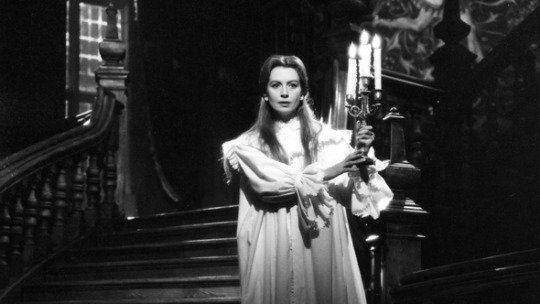
The Innocents (1961)
A young governess for two children becomes convinced that the house and grounds are haunted.
Frequently listed as one of the best horror films of all time, The Innocents (one of Del Toro’s direct inspirations -- clock the nightgown in the screencap) is a loose adaptation of Henry James’ seminal Gothic novella The Turn of the Screw.
So many more under the cut...

The Leopard (1963)
The Prince of Salina, a noble aristocrat of impeccable integrity, tries to preserve his family and class amid the tumultuous social upheavals of 1860's Sicily.
Another of Del Toro’s direct intertexts, which influenced Crimson Peak’s party scenes.
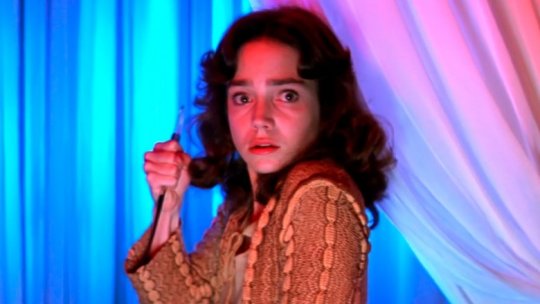
Suspiria (1977), the films of Mario Bava, and giallo cinema
An American newcomer to a prestigious German ballet academy comes to realize that the school is a front for something sinister amid a series of grisly murders.
A cult horror classic, Italian director Dario Argento’s Suspiria plays fast and loose with Gothic horror and fairy tale tropes, making for a slasher film quite unlike any other. Notable for its dreamlike surrealism, use of highly-stylized colorization, and sheer amounts of gore, Suspiria remains one of the most aesthetically influential horror films of all time and, looking at screenshots, you can maybe see its visual influence on films like Crimson Peak:
Guillermo Del Toro has also cited Mario Bava, another of the key figures in the golden age of Italian horror, as inspiration for his use of color and set design in Crimson Peak.
From Bava’s Black Sabbath (1963):

From Blood and Black Lace (1964):
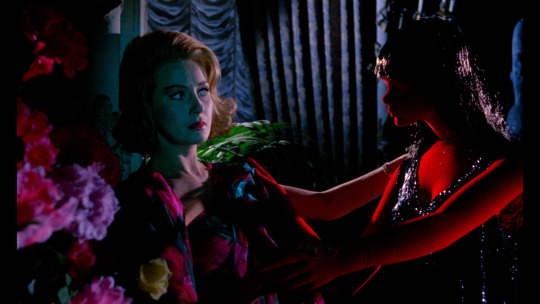
Bava’s film, Blood and Black Lace, belongs to the giallo genre, which refers (at least, in English-speaking countries) to (largely 1970s) Italian horror thrillers/slashers notorious for their combination of intense, stylized violence and eroticism. Very much a precursor to the American slasher film.

The Shining (1980)
A family heads to an isolated hotel for the winter where an evil spiritual presence influences the father into violence, while his psychic son sees horrific forebodings from both past and future.
As film that also loosely adapts “Bluebeard,” it’s perhaps unsurprising that there are so many allusions to Stanley Kubrick’s adaptation of Stephen King’s novel of the same name in Crimson Peak.
And, man, does it have it all! Snowed in, Gothic entrapment! Threats of domestic abuse! Secrets locked away in forbidden rooms! Ghosts! So many ghosts!

Ghosts in the bathtub!
Ludicrously enormous amounts of blood! Innocent waifs with the ability to commune with the dead! Intrepid third parties who heroically make an attempt to reach the isolated Gothic hellscape to help our damsel in distress only to get immediately merc’d! It’s all here, y’all.... except the incest, of course.
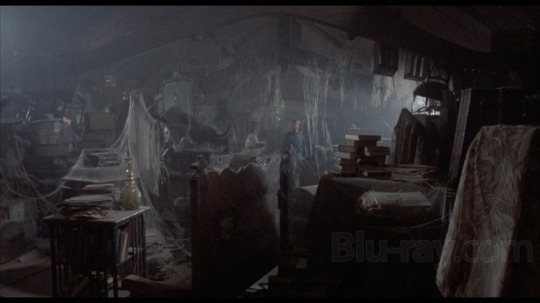
Flowers in the Attic (1987)
Children are hidden away in the attic by their conspiring mother and grandmother.
Ok, this is something of a cheat, as Crimson Peak is alluding more to V.C. Andrews’ infamous novel of the same name, not the 1987 film (which is an abysmally terribly adaptation and hilariously bad flick). Anyway, abused siblings are locked away in an attic... and... well... things get all... Sharpe family values, if you know what I mean.

Bram Stoker’s Dracula (1992)
The centuries old vampire Count Dracula comes to England to seduce his barrister Jonathan Harker's fiancée Mina Murray and inflict havoc in the foreign land.
If you liked Crimson Peak, I think you’ll enjoy this too, as, like CP, this movie is a sincere horror film, but also a pastiche/celebration of the Gothic and vampire cinema. It’s visually sumptuous and very high-energy (if you didn’t like CP or Moulin Rouge!, this one is probably not for you).
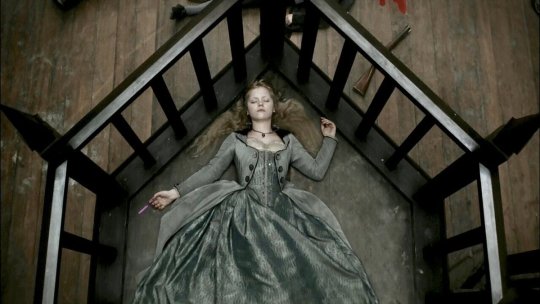
Sleepy Hollow (1999)
Ichabod Crane is sent to Sleepy Hollow to investigate the decapitations of three people, with the culprit being the legendary apparition, The Headless Horseman.
This is another one that, if you liked CP, you might enjoy. Based on Washington Irving’s "The Legend of Sleepy Hollow,” Tim Burton’s film evokes a number of genres and horror aesthetics, most notably the Gothic horror flicks of the 1950s/60s, to create a kind of Hammer Horror film for American Gothic.
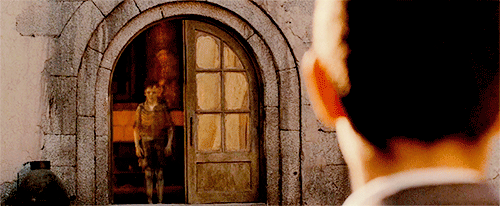
The Devil’s Backbone (2001) and Del Toro’s other films
After Carlos -- a 12-year-old whose father has died in the Spanish Civil War -- arrives at an ominous boys' orphanage, he discovers the school is haunted and has many dark secrets that he must uncover.
Crimson Peak is not Guillermo Del Toro’s first foray into Gothic horror, as ghost stories and dark fairy tales are very much his specialty (as we shall see again in Shape of Water later this semester). I highly recommend his ghosts-as-a-reflection-on-the-trauma-of-war film The Devil’s Backbone and his take on portal fantasy, Pan’s Labyrinth (2006), as they’re both excellent and you can see echoes between them and the effects/visuals of Crimson Peak.
31 notes
·
View notes
Text
A Brief Guide to Early Literary Dracula AUs
One of the coolest things about being a Dracula fan in the 2010s is all the recent publication of materials shedding light on all of the really bonkers alternate Draculas that either nearly became Dracula itself or spun off from the original 1897 text. So yeah... here’s a rundown of the three weird psuedo-canonical AUs that this fin de siecle vampire novel just sort of... comes with.
Stoker's Notes/Typescript/"Dracula's Guest"
Bram's notes for Dracula indicate that he worked on the novel for at least seven years, that it went through many substantial changes in its plot and cast, and that he had a lot of completely metal ideas that either fate, his editors, or his slender grip on good taste did not permit to appear in the final novel. Some of these things appear in fragmentary form in the typescript for Dracula. Some of them got recycled into a short story later published as "Dracula's Guest." Some of them only appear scrawled in Stoker's atrocious handwriting on the various papers collected at the Rosenbach in Philadelphia.
Highlights:
Things initially were going to take place in Styria and the villain's name was going to be Count Wampyr.
Arthur doesn't exist and Jack/Lucy is canon.
Jonathan Harker has a "shrewd, skeptical sister."
There's a third heroine named Kate Reed (or Kate Lee) who is school chums with Lucy and Mina and apparently helps to spread the flow of gossip about Lucy and her curly-hair beau going to St. James concerts.
There's a painter named Francis who probably discovers that the Count (in addition to having no reflection and showing up as a skeleton in photographs) cannot even be painted.
Other unused characters include a philosophic historian, a paranormal investigator, and a pair of deaf/mute servants in the Count's employ.
The Count has a secret chamber where everything is blood red, and it's apparently really scary.
Quincey might be a professional inventor named Brutus Marix. He also might go to Transylvania in the middle of the book. Also, he just might SAVE THE DAY DURING THE FINAL BATTLE BY OPENING FIRE WITH AN EARLY FORERUNNER TO THE MACHINE GUN.
There appear to have been werewolves planned.
Jack has a spooky party at his house where everyone has to tell a ghost story like they're living it up at the Villa Diodati. Dracula shows up and is the thirteenth guest at this super goth affair and presumably tells the spookiest story of all.
Jonathan spends three chapters/100 pages doing all sorts of crazy stuff that happens before what we now think of a Chapter 1 of Dracula. These shenanigans include encountering the Count pretending to be dead in a Munich leichenhaus, going to see a performance of The Flying Dutchman, and doing all that incredibly spooky stuff in "Dracula's Guest" where he has adventures with wolf friends on Walpurgisnacht.
Castle Dracula sinks into the earth in a VOLCANIC EXPLOSION after Dracula dies.
There is also mention of Dracula FLYING out of his coffin into the air during the final confrontation and the Brides getting taken out by chance BOLTS OF LIGHTNING.
Seriously. We have legitimate evidence that were we but in the true and righteous timeline, Dracula would have ended with lightning bolts and machine guns going off in an aerial vampire battle before a volcano explodes.
Makt Myrkranna (AKA Powers of Darkness AKA Icelandic Bootleg Porno Dracula)
So a few years after Dracula was published, it appears that somebody in Sweden ripped it off, made it much much more Hammer Horror, and published it as their own thing called Mörkrets Makter (Powers of Darkness). Then, after that, Valdimar Ásmundsson in Iceland ripped that off and republished it as his own thing called Makt Myrkranna (...also Powers of Darkness). This latter work just got translated into English in 2017, and there's been intense speculation as to whether or not whomever originally wrote this thing had anything to do with Bram Stoker and his early drafts for the novel, given that it is headed by a preface that is controversially claimed to have been written by Bram, himself.
Highlights:
The first four chapters of the book (the ones everyone tends to really like) are now massively massively expanded, and Jonathan Harker (now named Thomas) gets to spend much more time exploring the castle, trying to escape, having the Count tell him creepy sexual anecdotes, and watching busty women get murdered.
The three women in the castle have been condensed into one woman, who seems to be the Count's vampiric, incesty bride/cousin/whatever and whose death involved her being locked in a bedroom with her lover until he went mad and threw himself out a window.
Instead of finding a secret room of boxes with dirt in them, Jonathan Thomas finds a secret ritual orgymurder room where primordial ape men engage in forbidden revels while the Count bites hypnotized virgins to death.
Everything that is not in the massively expanded castle section is barely sketched out summaries of lots and lots of wacky things happening with no real explanation (apparently these portions were treated with more detail in at least one version of Mörkrets Makter, but that's not available in English yet).
Lucy (now Lucia) becomes a vampire, but she is never staked, and her plot is never really resolved. Arthur, convinced she is alive after people watch her get back up from being dead, orders that people leave out some blankets and snacks for her (very considerate), and then that thread just sort of ends.
Renfield doesn't exist. Jack sort of makes up for this gap in the novel's tragically dead madmen quota by going mad and dying himself.
Said going mad and dying is facilitated by him attending one two many freaky mesmerism parties at Carfax with the Count's posse of debauched, anarchist, international conspirator, orgymurder cultist noblemen.
Then like... a mysterious violinist shows up at his asylum and the next thing you know, the Count & Co. have taken over the joint, Quincey has to pretend to go crazy to infiltrate, and the entire place burns down.
There is actually some sort of police investigation into all of the many many many illegal things going on. After Van Helsing knifes Dracula to death, Quincey takes the fall for him, but the investigators don't end up taking him to trial.
Kazıklı Voyvoda (AKA Impaling Voivode AKA Dracula in Istanbul AKA Turkish Nationalist Propaganda Bootleg Dracula)
Taking a cue from Ásmundsson and whomever the Mörkrets Makter guy is (or not...), Turkish author Ali Rıza Seyfi wrote his own pirated version of Dracula and published it as his own work in 1928. Unlike the Makt Mykrannaverse, the world of Kazıklı Voyvoda is fairly faithful to the original text... save that the action is transposed from London to Istanbul, the events of the story now postdates the Turkish War of Independence, and the entire cast (Dracula excepted) is now very Turkish and very fond of waxing eloquent about their immense national pride in being very Turkish.
Highlights:
Dracula is explicitly identified as being Vlad III, and he is a marauding terrible foreign menace from the exotic West, persecuting the good Eastern folk of Istanbul just as he historically persecuted and impaled their ancestors before them. Anyone who has ever read and enjoyed any academic essay on Dracula and the colonial gaze may begin to salivate uncontrollably.
Forty-seven years before Salem’s Lot, Seyfi establishes that pretty much any religious symbol works on a vampire if you believe in it, and everyone throughout the text waves around charms made out of suras of the Koran and such to great effect.
Azmi (Jonathan) gets the tiniest scraps of expanded backstory in which we learn about his childhood predisposition towards fainting and the existence of his pious mother who took him to saints’ shrines in the hopes he might faint less.
Güzin (Mina) is no longer one of Dracula’s victims (unlike in the 1953 film adaptation of this book). She is, however, still an incredibly hardcore researcher nerd who makes sure to tell her fiance all sorts of cool Vlad III history facts.
Turan (Arthur), Afif (Jack), and Özdemir (Quincey) all served together during the war and became bros that way instead of just being three guys who went on crazy globetrotting adventures together before all independently deciding to propose to the same girl.
Resuhȋ (Van Helsing) makes sure to drop a line reminding everyone of that time they all did blood tests and found out their blood types are compatible... you know... just in case anybody in this post-blood-typing era might be doing a bunch of blood transfusions and worrying about fatal hemolytic reactions.
#Bram Stoker#Dracula#Powers of Darkness#Dracula in Istanbul#Valdimar Asmundsson#Makt Myrkranna#Morkrets Makter#Ali Riza Seyfi#Kazikli Voyvoda#Drakula Istanbul'da#vampires#assault
1K notes
·
View notes
Text
Random thoughts while watching... OSK Revue?
I finally saw my first OSK Revue show (Dracula, 2017), so thought I'd write about it. This is not a proper review, just a bunch of random thoughts. I will be making a lot of comparisons to Takarazuka in this, and please understand that I do not mean to imply that OSK is just a zuka copycat, I simply wanted to compare the two and see what they have in common and what not (also, all opinions are about this production and these actresses only, I'd need to see more shows to form a proper, better educated opinion on OSK's style as a whole.).
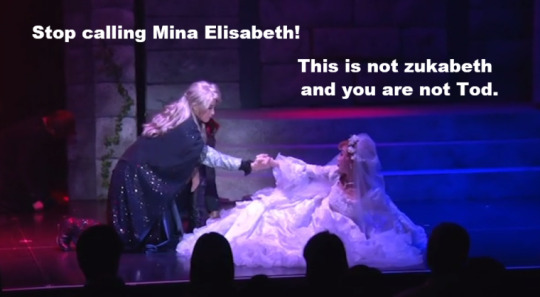
First impression was a surprise at how small the production is. I knew OSK isn't as big as zuka, but still, the theater's stage was very small and there were only about ten actresses, many of them pulling several roles, I think. I felt like I was watching a Bow Hall show cut in half both by stage length and actress numbers. Having a small number of actresses causes there to be some slower, quieter scenes, where a character monologues for a while so that everyone else has time to do the costume change.
Even so, it still felt very similar to zuka. Despite the small stage, they do dance, including a post-show minirevue that includes the main otokoyakus dancing in pretty, sparkly tailcoats and a duet dance with the main leads. The makeup is similar but there's some small differences that I'm not expert enough to point out (don't know anything about makeup). There are some stylistic differences in zuka makeup too, so it felt like I was watching a sixth zuka troupe and this was their troupe's personal style.

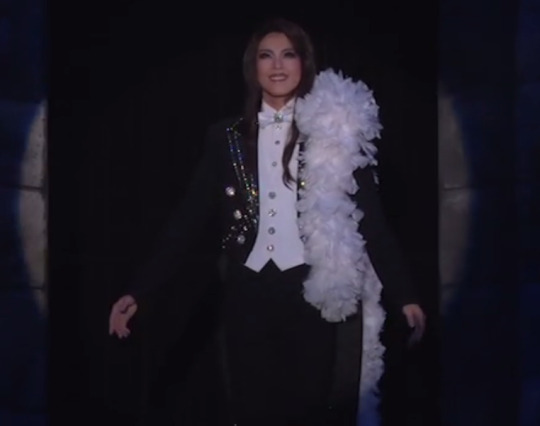
Minirevue dancing (and look, some parade feathers. Small feathers but feathers none the less.)
Otokoyaku still sing like otokoyaku and musumeyakus sound just like zuka musumes. I liked the leading otokoyaku's voice, it was pleasant to listen. Though she has to do a lot of angry angsting throughtout the musical, which is occasionally bad for her voice, making it sound like she has a bit of a sore throat. The songs were ok, nothing particularly memorable or catchy. A lot of the music is rather simple, like piano music and such.
I admit, when I was putting the disk in the DVD player, I was chanting in my head ”Please follow the book at least barely, please don't be weird and rewrite the story wildly.” Well, no such luck, this isn't a book faithful adaptation. Which unfortunately leads to me not having a clue what the hell is going on most of Act 1. But I am happy that it's not a comedy or a super weird adaptation.
I have to say that seeing a completely serious take on a vampire musical is a breath of fresh air and something I wish zuka could do. Don't get me wrong, I love the lighthearted vampire shows like Seal of Roses (which maybe didn't aim for lighthearted but kinda accidentally became one). Zuka always makes the vampire stories, well... kinda weird (I've already ranted about the randomness, plot holes and inconsistent vampire lore in my Random Thoughts While Watching Zuka #4). I appreciate them thinking outside the box and surprising me instead of recycling the most generic vampire story plots and tropes, but as a vampire lover I would die for vampire show that actually takes itself seriously. I suppose the Poe Family show is a serious take on the subject (no comedic parts or weird story elements), but that is probably thanks to the source material. Zuka can do cool&dark, they've done Elisabeth, so if they wanted they could make truly awesome vampire shows.
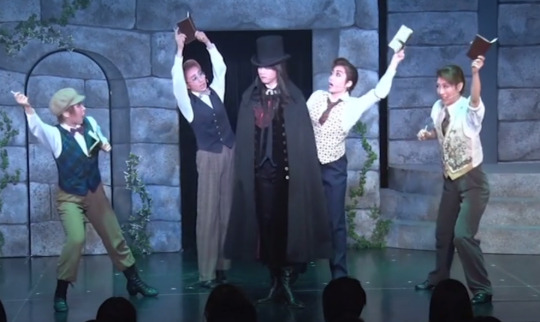
While I said that this is a serious take on a vampire story, there's still a short comedic song number in the beginning of Act 1, where a bunch of reporters try to interview Dracula after his arrival at London, only to have him scream NO COMMENTS at them.
This show uses sound and screen effects a lot. Most of the time they make sense (like hearing the sound of a train in the station) but there are moments where I hear a random noise or see strange images projected on the screens and go ”What the hell was that?”
There are only three big roles in this show: Dracula, Mina and Jonathan Harker. There's also this one lady in black who I suspect to be the spirit of Dracula's dead wife, who he grieves and longs for all the time. So yeah, the beginning of Act 2 reveals to us that this show has taken inspiration from Coppola's Dracula and lifts the vampire's origin from the movie. He was a warlord in medieval times (which means he's dressed in armor and has a sword YES me likey) and somehow a false letter was brought to his wife claiming that he had fallen in battle, which led to her committing suicide. When human Drac got home to discover his wife dead, he was devastated and broken, that is, until he hears that the church refuses to bury his wife because suiciders are sinners who go to hell. There's a literal DUN DUN DUUUUN sound effect as the count builds up rage, then curses God and allows the forces of evil to corrupt his body in order to revenge. He then proceeds to kill all of the priests/monks/whatever the church folks were supposed to be.
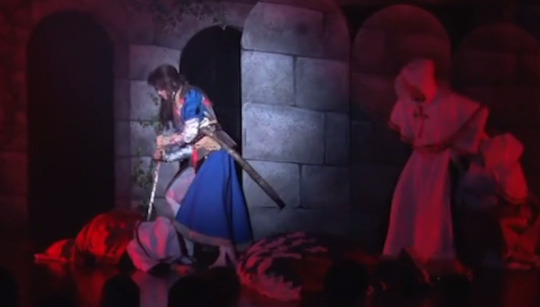
This slaughter of innocent unarmed humans would be brutal and super dramatic, but the fight choreography leaves... much to improve. Yeah, zuka battle choreos can look like they're from the 60's Batman too, with punches that miss by a mile, but here... the stabs are so lazy it looks like the poor victims are literally walking into his sword.
If Heaven won't accept
my suicided wife
I'll follow her to Hell!
(...and lick her knife.)
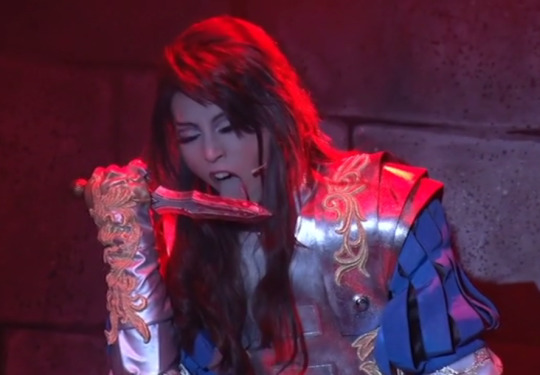
Not gonna lie, this is something I haven't seen zuka do. Sure, they've implied licking things, but it's always done quite swiftly and * elegantly * and not, well, like this. Tongue out and all, literally licking the knife prop.
I was curious to see if the kisses are still fake or not, since OSK is free to have their own traditions and don't have to follow rules set by Hankyu. Also, I keep hearing rumors that OSK is supposedly more daring than zuka when it comes to love scenes. Not in this show, at least. The romantic scenes are very chaste and more cute than sexy (also, the blood drinking scene, while definitely romanticized and very nice&dramatic, not any hotter than the blood drinking scenes in zuka). And the kisses are very much fake. Oh well, the actresses are spared of messing up their lipstick.
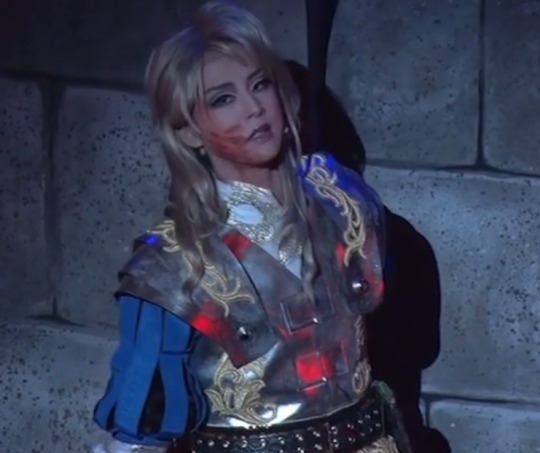
Speaking of messing up lipstick, I know that stain is supposed to be blood but it looks like a group of amorous ladies gave the count several sloppy kisses.
So, my guess for the plot is that Dracula comes to London in search for the woman who is the reincarnation of his wife. To lure women for him to see, he puts up... a fashion show or something? Dresses are on display, including dead wife's wedding dress. Which Mina gets to wear, and Dracula is immediately convinced she's the incarnation and for the rest of the musical never calls Mina by her real name, just by the wife's name. Which is... Elisabeth. I don't remember what the wife's name was in Coppola's movie, but still, the dramatic way Dracula pronounces this name does make it sound like it was lifted from another musical.
In Act 2 Jonathan, on his way to rescue his girlfriend from the vampire's castle, meets an annoying little kid. And yeah, just like in zuka, there are no child actors in OSK, children are played by adult women using cutesy kiddie voice and being super genki. But then the kid finds the knife that Elisabeth used to suicide herself and turns to face the audience while holding it, and I was like ”Great. The annoying kid has turned into a creepy kid.” If the child had turned out to be a vampire and in team Drac all along, that would have been an awesome plot twist. But instead he's actually an angel or something like that, providing Jonathan with the weapon that can kill the vampire.
Dracula has a bunch of vampiric minions at his castle, not just the three brides. I have to ask, what is it with vampire shows having one main vampire who behaves normally and then having a bunch of background vampires/minions who speak/sing like they're high as a kite and lumber around dancing artsy inteeeerpretive dances? It's... weird. Why are some vampires normal and some complete fruitbats?
This Dracula must be the angstiest version of the character I've ever seen. There's occasionally great moments where he's charismatic, seductive or in rage mode, but the majority of time he is either silently depressed or actively whining (even many of his angry scenes come out as more whiny than aggressive). It's a very dialogue heavy show and because of the language barrier and free adapting of the story, I have no idea what his angsty dialogues are about. But whatever he says, he actually manages to win Mina's sympathy and they dance together. Even if they kiss, I still think Mina's feelings are more pity and less sincere romantic interest. Also, I should point out that I have nothing against depressed, angsty, reluctant vampires in general, it's just that I don't usually associate that kind of behavior with Dracula (depression and angst is more sir Francis Varney's thing.). Dracula is cold, ruthless, cunning and irredeemably evil, not some emotional lovelorn wreck.

I have said this before and will say again: Dracula does not aishiteiru.
Jonathan makes an attempt to save Mina but doesn't get to kill the count. Which is good because while the Jonathan of the book would definitely want and be able to fight the count, this musical portrayed the character as a cute and awkward softie nerd (I approve, not all male heroes need to be tough guys) and avoiding getting his hands wet with blood was a good move. Poor guy would be traumatized for life, even if it would be to save his girlfriend, he's just not a killer. Instead, Dracula decides to let the lovers go free and suicides himself, like he usually does in adaptations where they make him have a romance with Mina.
You know how in zuka there's the tradition that in the end the dead characters make an appearance dressed in white, to sing and prance around in an afterlife epilogue. Well, not in this show, but there is something kinda similar. In the ending scene the spirit of Elisabeth appears behind the dying count and poses dramatically with him, spreading her cape like white bat wings, taking him with her to afterlife. I think it looks cool.
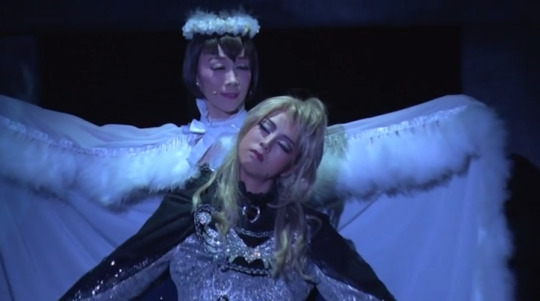
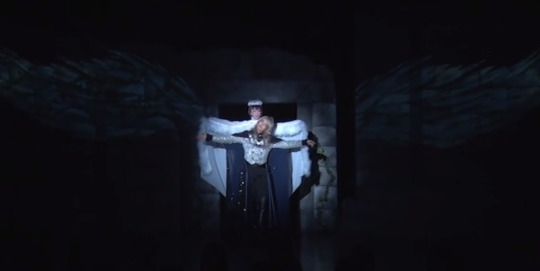
To end this, let's talk about the blood drinking scene. In all vampire stories, these are the most important scenes, in my opinion. Blood drinking is what vampires do, it's their trademark thing, and if you chicken out of showing it or handle it lazily, then why the hell are you making a vampire story in the first place. You don't make Phantom of the Opera adaptation and fail to have the unmasking scene be the most dramatic and memorable scene, and similarly, you don't make a vampire story and fail to deliver the blood drinking scenes properly. Yes, I have weirdly strong opinions about this, deal with it.
Very early in Act 1 we see Dracula suffer from malnutrition, his hair turning gray and his knees failing, making him slump to the ground, very visibly suffering. For emergency he empties a small vial of blood that doesn't seem to make him get any better. And it is this moment when Jonathan decides to visit him for the first time for work-related reasons (no idea what his profession is in this story. In the fashion industry?). So, we have a thirsty vampire and a nice, cute bloodbag in the same room all alone.

Me: Drink him!
Dracula: Nope. I'd rather suffer. :)
What the hell? In the book he totally noms Jonathan. Is this because he's a male? This Dracula afraid to drink from someone who has icky boy blood? Oh well, he gets better later anyway, so I assume he gets some blood off-stage. But still, it was very confusing to see a starving vampire not take advantage of an opportunity of some easy blood.
Well, later Dracula is introduced to Mina and immediately decides ”This is the One.” And I cheer him on.
Me: Drink her!
Dracula: No. Now is not a good time. :)
Me: Damnit! DRINK SOMEBODY!!!
We have to wait all the way to the end of Act 1, but finally, we get a genuine on-screen blood drinking scene. Just as important as the moment of blood drinking itself is what leads up to it. In this musical it's Jonathan piecing together all the clues and finally getting Dracula's real identity (in a rather nerdy monologue of stuff like ”...Dracul means Dragon, and the A at the end makes it Son of the Dragon... wasn't there a warlord named like that in Romania hundreds of years ago...”).
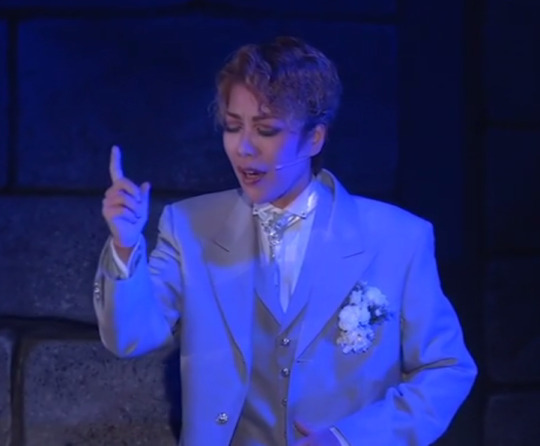
Nerdsplaining time!
Terrified with his discovery he tries to save Mina, who Dracula has just kidnapped, spilling the beans for her as well. The revelation of Dracula's vampiric nature scares the two humans and there's plenty of dialogue that goes over my horizon, but I do get that the thing that makes Dracula snap is when Mina confesses to loving Jonathan.
The jealous vampire then starts to torture Jonathan by... some kind of Darth Vader mind-choking magic. Well, I suppose it's choking, because Jonathan holds his hands around his throat as if struggling against invisible fingers, but the sound effect doesn't suggest choking at all. It actually sounds much more gruesome and painful, a nasty ripping sound, as if the count is telekineticly tearing the poor man limb from limb and simultaneously flaying him alive. Eww, it's a gross sound effect.
Mina obviously can't idly just watch as her boyfriend is painfully tortured to death while she has the power to put an end to it. To save Jonathan, she loudly exclaims that she doesn't love him. And the count, being a little bit of an idiot here, buys it. Strangely, Jonathan seems to buy it too, crying Mina's name in disbelief. The torture ends (thank goodness), and to make sure no harm comes to Jonathan, Mina tells Dracula that if you're really a vampire and if it's blood you want, you can have mine!
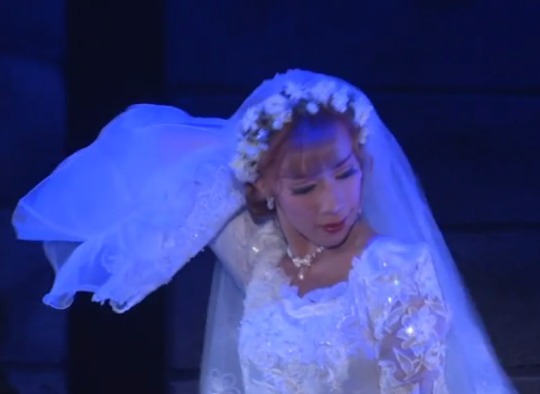
Just let me gather this bothersome veil...
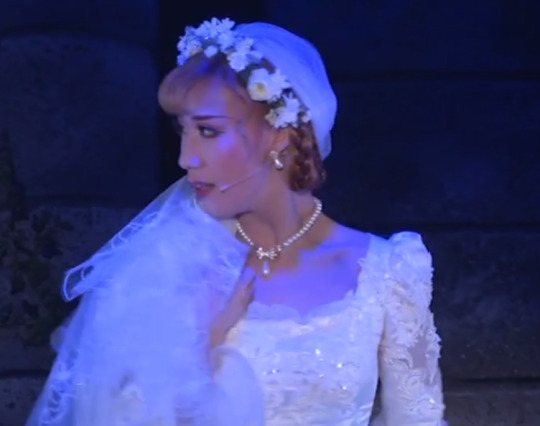
...and Behold! Vampire bait.
She dramaticly pulls the veil of the wedding dress on one shoulder and reveals her neck. I love this. And so does Dracula. This is the one moment where his eyes actually light up with passion and while he attempts to stay cool, you can see his chest rise as his breathing gets faster with excitement. Darn right, count. Blood offered by free will is the best stuff there is. And it was about time you finally drank someone.

It's always interesting when humans offer their blood to the vampire out of free will, because there's usually good and complex reasons behind it, and this is no exception. Mina doesn't offer her blood out of sympathy or under the influence of vampiric hypnosis or even being seduced by the pretty blood drinker. It's offered by free will but it's very much not concensual. The offer of blood is the only way she can distract the vampire long enough to let Jonathan escape and get help. By playing along with the count's delusions about Mina being the reincarnation of his wife, she is cleverly buying time, manipulating him. Only, unfortunate for these two, there is no van Helsing or any other member of the book's league of merry vampirehunting men in this show for Jonathan to run to, so all he can do is to follow them to the castle and attempt a lone rescue mission (which fails).
Frankly, the one who eventually defeats Dracula (kinda) is Mina, who manages to win the count's sympathy (making him learn the good old ”if you really love someone, you'll want what's best for them and let them go instead of selfishly trying to force them to stay with you”). And this blood drinking scene is the first time we see that she is aware of the power she has over the vampire. Maybe in the end she didn't exactly intend to make him commit suicide, just trying to make him let them go, but old Drac was living a horribly depressed and angsty unlife anyway, so it doesn't surprise me that he decided to end it. That's why the (kinda). Mina has great influence over Dracula but I do think his decision to die a final death seems to be not a result of manipulation but a genuine decision. Though he still technically makes her do it, by forcibly placing the knife in her hands and then grabbing her wrists, stabbing himself, making her involuntarily deal the killing blow. Kinda dick move (Mina is quite horrified of this, understandably), but at least I'm happy Mina doesn't kill herself too in this one (yes, I'm still angry at that ending in 2011 Wao Youka's Dracula. The count kills himself so Mina can go back to being human and back to Jonathan. And then the dumb woman makes the count's sacrifice completely pointless by throwing away the life he attempted to save.) Dracula ends his unlife but Mina and Jonathan return to the world of the living, where they belong.
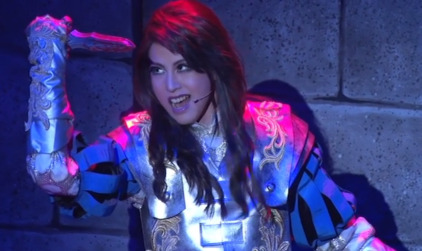
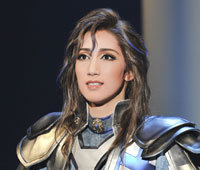
Final random thought: Knightly warlord Dracula looks a bit like Lancelot’s long lost, dangerously unhinged brother. (it’s the wig and the silver armor with blue details. The actresses are very different.)
16 notes
·
View notes
Note
Top five characters from literature (and why, if you're feeling chatty)
I tend to forget about literally everything I’ve ever read when I’m in a position to talk about it, so I’m going to do my best.
(1) Bres mac Elatha - Cath Maige Tuired, Cath Maige Tuired Conga, and a load of other assorted medieval Irish myths.
My boy. My son.
There’s a lot I could say about him, and a lot of it I wasn’t able to fit into my 45 page Capstone. Sometimes, in my (fairly short) life, I’ve been lucky enough to come across something that happened to be exactly what I needed at the time and, for my 14-15 year old self, that happened to be an obscure Irish deity who ends up choking on bog water. As you will.
I didn’t start out liking him; it’s very, very easy to accept a simple version of the text where he’s just a moustache twirling tyrant, and even though it’s not an interpretation I AGREE with, seeing as it’s…boring, as a concept to me, it’s just as valid as anything, given these texts were meant to be interpreted and reinterpreted and transmitted and then rewritten from the ground up to suit the times. Cath Maige Tuired Bres is actually an anomaly; before that, he seems to have been an esteemed member of the Tuatha dé.
Which, I suppose, is part of why I like him. There’s an ambiguity about him, a crossing of lines. Even in CMT where he’s at his most villainous, he’s fairly unique, having many of the traits of a hero and, I would argue, he is as much the protagonist of the text as Lugh is. He has the heroic birth with a missing father, the strange childhood, the trial by combat, etc. And yet, in the world of CMT, with the context of the Viking invasions, he just doesn’t have a chance. He’s a fundamentally doomed character from the beginning, with his own actions damning him in the end.
His very existence in the tribe, the son born out of the most “proper” form of medieval Irish wedlock (seeing as there were nine, I hesitate to apply the term “bastard” to Bres, but the circumstances were NOT the ideal) to an unbetrothed noblewoman of the Tuatha (THE FUCKING SOVEREIGNTY OF IRELAND) and the king of a neighboring tribe, really warps the social structure, and it’s something he kind of carries throughout his life. He isn’t like Cú Chulainn, who is probably the one character who comes closest to him as far as his place in the tribe; he’s not content to serve the maternal side of his family as a champion, doing as he’s commanded. He wants power, and, when he’s removed from power, he takes desperate measures to take it back and, in the process, loses everything.
And, really, that essential liminality extends into his relationship with gender and power structures. While he’s supposed to represent order, as the king, he has no taste for the nobility; he makes them work (!!!!), he doesn’t give a bard due hospitality, he doesn’t give the warriors ale and meat. You get this image of him as this kind of distant, isolated figure in the tribe; not particularly JOYLESS, per se, at least in my interpretation of him (given we don’t see him happy all that often, the interpretation is open), but one who takes joy in things very, very different from the rest of the tribe, or at least from the men. Instead, his closest relationships in the tribe are to the women, who are the ones who elect him. His mother is his most constant ally, being willing to travel with him to see his father, even if it means leaving her own tribe to do it, and she’s the one he goes to IMMEDIATELY for help. And, when his mother addresses her father, it’s notable that SHE’S the one who takes control of the narrative, not Bres. Bres only confirms it when his father asks him. I wouldn’t say that he’s a feminine-coded character, specifically, though I think there are elements of that, but he definitely does not fit the expectations of how a medieval Irish nobleman is to behave with his own sex and with the opposite sex. At the risk of going full-on Pretentious Academic here, it reminds me of what Jeffrey Jerome Cohen wrote in his Seven Monster Theses, where he wrote, “By revealing that difference is arbitrary and potentially free-floating, mutable rather than essential, the monster threatens to destroy not just individual members of a society, but the very cultural apparatus through which individuality is constituted and allowed.”
And, in other texts, I think there’s decent enough subtext to do a queer reading of Bres. Like, in Cath Maige Tuired Conga, which is a sort of prequel to CMT, Bres appears as the champion of the Tuatha dé, a completely normal part of the tribe, and he meets with Sreng mac Sengann, the Fir Bolg champion, and their meeting is…interesting to me, in how intimate it is, as far as two men from opposing sides sent to essentially size up the enemy. There’s a certain…familiarity with one another. They know that if their tribes go to battle, it’s going to be a bloodbath, and there’s really no personal dislike for one another. They even ask each other where they spent the night! (Which, it’s a common enough phrase that I’m not going to tie it to The Wooing of Emer, but…) And then, at the end of their meeting, they each give each other one of their sharp, pointy weapons to bring back to the tribe as a show of what the other tribe can do, and the text says, “They parted in peace after making a compact of friendship with each other.” It’s just…a very unusual scene, in terms of champions meeting up with one another, and it’s one that I think I could spend a lot more time with if I was given the opportunity. And curiously enough, they keep the vow of friendship! Throughout the rest of the fight, you see everyone being paired off against their equal, but Bres and Sreng never go head to head even when Sreng takes the arm off of Bres’ king. Instead, Bres goes for Sreng’s king.
Personally, for me, he only really clicked when I was going over CMT again and I was looking over the scene where Bres meets his father for the first time and he says, “Do you have any advice for me?” and I was like…fuck. This is the first time he’s ever met his father, and the first words that his father’s ever said to him are essentially, “Why aren’t you leading your own people? What have you done wrong?” which is doubly painful when you realize that his father was one of the Fomorian lords who were raiding Ireland earlier. At the risk of going personal here, at the time when I read those lines and had them hit me, I was in the process of divorcing myself from my own father, who, like Bres, I had had a distant relationship with, as he lived across the country and was happier with the idea of having a picture on a mantelplace than a daughter who wanted something as inconvenient as his attention. Reading that, and thinking about my own situation, I was like, “Yeah, I get you” and, from then on, I really read him and the text in a wildly different light, especially when I started to think about the repercussions of, say, Bres having the growth of a 14 year old at the age of 7. Like, if you take this text realistically (which…you can or you can’t, because these texts are over the top by their nature), he never had a childhood. He was just moving from one stage of growth to another, with the tribe probably being all too eager to put a spear in his hand because Well, he has the growth for it now and That’s Just What a Man Does. Which is something that I ALSO understood, deeply, and is something that I wish more adaptations of CMT would take into account besides just forcing Bres into the role of “Entitled Brat.”
Also, if my dissertation up there wasn’t enough: According to some genealogies, he’s The Morrigan’s nephew, given that both Eriu, Bres’ mother, and she are both listed as daughters of Ernmas. Like, if you don’t love him for the batshit insane, Extra antics he finds himself in (like the time the Dagda, his half-brother/father-in-law decides to distract the husband of the woman he’s banging by sending him on a mission to Bres), you’ve got to love him for his batshit insane, extra, goth family.
(2) The Countess - Makt Myrkanna (AKA Weird Ass Swedish Dracula.)
This will hopefully be briefer than my little essay up there, mainly because there’s really not all that much information on her in text and it’s been awhile since I read her scenes (and even then, a lot of that was me rereading it so that I could write the Countess/Lucy smutfic that I am probably never, ever going to let see the light of day. Which. Vampire smutfic. Light of day.)
BUT…why I like her. Makt Myrkanna is a very, very different work than the original Dracula, extending the scenes in the castle while condensing the rest of the novel to a truly dizzying extent, to the point where we have no idea whether Arthur Holmwood’s actually…alive by the end of the book given that the last time he was mentioned, he was stalking Lucy’s grave given that he thought she’d been buried alive. RIP Artie. To me, though, it really, really shows in the figure of the Countess, who is very different from the three women Jonathan meets in the original novel. There, even though there is a lot of subtext about what their relationship to the Count is, some of which might not have been printable in a Victorian novel (at least not one to be sold to the public), the brides really only have the two key scenes: Once when they tempt Jonathan and Dracula intervenes, and then again when they try to get Mina to join them and then Van Helsing goes down and stakes them. They’re probably one of the most memorable parts of the novel and certainly a BIG influence on the portrayal of vampire women in fiction, but they’re not…there all that often.
The Countess, however, is a far more formidable figure. She does not seem nearly as pleased in her current position, seeming to be held in place by Dracula, who it’s heavily, heavily implied might have been her husband (?), though he also shows just as much disdain for the man’s actions towards her in life that it’s kind of hard to tell one way or another. (Like a lot of things in Makt Myrkanna, it’s toyed with and then never picked up again.) No matter what, he definitely wants to bang her and probably has on multiple occasions, given that he describes her, uh, attributes to Thomas while showing him his collection of dirty paintings. (Yes, Dracula has a porn collection in this one.) For the Countess’ part, there seems to be a certain…fear that the Count inspires in her, or at least a sense of caution with her quickly ushering Thomas Harker (inexplicably, Jonathan becomes Thomas in this translation) away. Obviously, she’s on Team Dracula in the end, she very much wants to eat humans, and she’s not a Broken Bird, but you do get the sense that she has some sort of agenda of her own and that, perhaps, there’s a sort of power struggle being waged in Castle Dracula that Thomas is more or less oblivious to (he’s a bit busy dodging human sacrifices).
She also represents far more of a temptation than the original brides, who Jonathan…is interested in, with the reference to “almost wanting them to kiss me” (or something; I don’t have Dracula on hand and, if I spend too long searching, I know I’ll never get this done), but it’s still not…..in depth. Like, Jonathan loves and is faithful to Mina, even though he’s ashamed when he shows her his diaries because of that line. Thomas Harker, his counterpart here, though, reacts…very differently, trying to keep his calm but, “The moment she turned towards me and locked her incomparable eyes with mine, it felt as though an electric current surged throughout my body. I grabbed a nearby chair and held onto its backrest. She looked steadily into my eyes, and it didn’t even occur to me that I should have greeted her, or that my behavior was doltish. But evidently neither did she see a need for salutations. It felt as though we had already known each other for a long time and therefore didn’t need to explain ourselves.” There’s this hypnotic effect that she has on him, and unlike her three counterparts, she is perfectly willing to wait and talk with him for long periods of time.
Also, unlike her other counterparts, we get her backstory detailed to us, with her being described as being just as ruthless and cunning as the Count even as a child, with her being described as, holding, “the hearts of men at [her] fingertips, playing with them as a child plays with grapes before sucking out the liquid.” And in her lifetime, she was powerful, with Dracula saying she, “Held the destinies of whole nations in her hands, though few suspected it. Heads of state, kings, and emperors, lay at her feet–or in her arms.” Ultimately, her only downfall was when her husband ended up locking her and her lover in the bedroom together so she could sex him to death. Literally. He jumps out a window. And then her husband had a funeral service performed but, given she’s walking around the castle, we can presume it didn’t stick.
(3) Asriel/Mrs. Coulter - His Dark Materials
I’m including both of them because it’s not necessarily the two of them I like as individuals; it’s their dynamic. I mean, I do very much like them as individuals, they are each favs in their own right, but their dynamic is essential to that as well. They both complement and bounce off of each other very well, having this kind of spark where, even though they absolutely despise each other for most of the trilogy, they are really the only two who match each other. They’re both incredibly magnetic; like, in his first scene at Jordan College, I was pretty blown away by Asriel’s presentation, in his confidence, his ruthlessness, his intelligence, his pride and his ambition, all of which are also mirrored in Mrs Coulter. They simply happen to have landed on separate sides, with Asriel trying to essentially tear down everything that Coulter stands for and Coulter seizing control in the Church because it’s the only thing she really has as far as options, since she lacks the privileges Asriel has as a man.
They both do horrible things in the pursuit of their goals, including killing children, with Coulter being essentially the embodiment of Stranger Danger, and they both harm Lyra both physically and mentally. Still, when they let their guard down, on the FEW occasions they let their guard down, it is shown that they have some amount of love for Lyra, but they fundamentally don’t know how to be parents when all their lives have been spent in the pursuit of power and knowledge and all the ways those two intertwine.
I’m not sure how much I fully believe in Mrs Coulter’s swerve to motherhood, whether it was the best writing decision, whether it leans into the overall weakening of female characters in the last book or so, with Lyra being another notable victim, but I do think there’s a tragedy in there, as far as her trying but failing. And there is something in the classic femme fatale, generally seen as sexual but cold and unmaternal, dangerous in her embracing of sexuality sans procreation and motherhood (and monogamy!) being allowed to HAVE those kind of feelings and to have a complicated dynamic with the father of her child who she still has obviously holds some feelings for. And for Asriel’s part, he WAS ready to sacrifice Lyra, but he was also HORRIFIED by it, and in the end, he does repeatedly show that he cares, I just think that ultimately he let his own lofty goals get in the way of that until it was almost too late.
I really think that the best showcasing of them as characters tends to be with them together, such as in the third book when she steals the Intention Craft. She comes in there a prisoner, Asriel doesn’t WANT her there because he knows she’ll pull something, but she’s able to trap him in his own words by playing his commanders like a fiddle, and then she takes advantage over his desire to show off his new toy to get her an in, with Asriel then letting her go with one of his spies in the craft with her, knowing fully well what she’s going to do next and then going back to his improved prototype for more scheming. Like, they’re always trying to one up the other; it’s essentially a form of foreplay for them (as much so as you can get in a kid’s series about killing God), and I can only imagine what they were like when they were actually in a relationship, because they must have been terrifying and yet, for whatever reason, they both fell in love with each other to embark on a forbidden affair with each other, when she was married to a highly powerful man, risking everything.
So, I’m going to be curious to see what the new BBC series ends up doing with them, both as individuals and as a pair.
(4) Morgan le Fay - Like, a hundred different Arthurian adaptations
I’ll be honest: Morgan le Fay in The Magic Treehouse was one of my first crushes. I was always strangely drawn to books with her in them, looking at the pictures for a while.
These days, I have broadened my Arthurian knowledge significantly, though not nearly as much as I’d like to, but she’s still my eternal favorite. (Literally any book or film that tries me to root for Arthur over Morgan is going to fail miserably.) She is the embodiment of the Other in a woman, being otherwordly in her name and in her powers, but, like Bres and any other character from a long tradition, she is ambiguous in her presentation. Sometimes, she loves her brother and truly wants to expose the love affair between Lancelot and Guinevere to save his honor. Sometimes, she wants to create destruction for destruction’s sake. Sometimes, she reconciles with her brother and gives up the fight, sometimes she only relents when she sees his dead body there. She is always powerful, but the way that power is applied and, at times, not applied is part of what makes her fascinating and why, I believe, she is still subject to so much study after all these years.
The backstory as far as her mother and Uther gives her VERY strong motivation for why she would be less than pleased with Arthur, though I tend to favor the story of her expulsion from Camelot for having an affair with a kinsman of Guinevere’s for the delicious, delicious irony involved.
She is more of a schemer than her sister Morgause who, despite the oddness of her family, tends to be a loving mother (who just…happens to take a lover many, many years her junior and pays the consequences) in works that don’t take off from sexist Victorian bullshit. (I have many, many feelings over the portrayal of Morgause, and they’re very complicated so I won’t vomit them out.) Like, she successfully steals the sheath of Excalibur, and came very, very close to killing both Arthur AND her husband with the whole Accolon thing.
Also, she literally has a dude come into Camelot dressed in green so she could terrify Guinevere AT CHRISTMAS and then continues to troll her nephew for a year (and a day!) Like, name a greater icon.
(5) Shiloh - Saving Shiloh
A Very Good Boi. Doesn’t die at the end, unlike SOME literary dogs that I could mention whose authors thought that kids needed the slow, creeping inevitability of death forced into them. A+ pupper.
1 note
·
View note
Text
My Current Top 10 Musicals
So, I thought I’d just make a little list of the musicals that I personally consider to be my absolute favourite ones at this point in time. This list will obviously change again when I find a musical that I like more than one on this list. Anyway, here’s my list, if anyone’s interested XD (Btw, I’m only talking stage musicals here, so if you see any musical that was also a movie, I am talking about the stage version).
But first...some honourable mentions that I still adore but didn’t make it into my Top 10: The Phantom of the Opera, Anastasia, Ludwig II, Mozart!, The Lion King and Jesus Christ Superstar.
PS: All of this is opinion-based. Of course, you will disagree with me at some point, that is just natural. And it’s great that everyone has different tastes!
10 - The Lord of the Rings: A LOT of people have not heard about this musical, but it actually exists. It’s nothing fan-made or anything, it’s an actual official musical adaptation of The Lord of the Rings, not the Peter Jackson movies but the actual Tolkien epic. It ran in Canada and the UK and was even supposed to make its way to Germany. Of course, it has changes in it because adapting the entire story into a three-hour stage musical is an impossible task. It’s also the only musical I know of that consists of three acts rather than two. There is actually a cast recording available with the main songs in it. Like, honestly, I personally just love this musical. For instance, take a listen to Galadriel’s big solo:
youtube
I know, I’m most likely in the minority here, but for me personally, The Lord of the Rings is one of the best musicals out there and it’s an absolute shame that it’s not performed more often.
9 - Wicked: I am an absolute fan of seeing the story from the antagonist’s point of view and understand all of their motives. Wicked is one of the best examples out there as it takes the classic tale The Wonderful Wizard of Oz and gives it a darker and more serious spin, mainly because the Wicked Witch of the West is now the protagonist. I know, this musical is loved by everyone and makes it into pretty much everyone’s top list, but...honestly, it really deserves it. The songs are amazing and the story is very touching, especially the relationship between Elphaba and Glinda. I love villain origin stories, and to this day, the part where Elphaba decides to embrace her role as the antagonist of the story still sends shivers down my spine. No Good Deed still counts as one of my favourite villain songs. I have seen this musical twice and would gladly go again whenever I get the chance to do so!
8 - Rudolf - Affaire Mayerling: Ok, so this is a little bit of a controversial situation for me. I LOVE historical musicals. I just love them. However, this musical is REALLY not what you would call historically accurate. However, to me, it doesn’t really matter. When I look at it from a musical theatre point of view, it’s actually really entertaining! I have never seen this musical live, only watched the DVD and listened to the cast recordings but I would LOVE to see it live once. The songs are so good! While the story is not the best, the music is phenomenal in my opinion. And it also has one of the most catchy villain songs to be ever put on stage: Die Fäden in der Hand. Yes, this musical has MANY flaws, I don’t deny that. The cheesy and historically non-existent romance between Rudolf and Mary is not really the best thing to watch (seriously, why didn’t they include Mizzi Caspar instead of Mary, that would have made MUCH more sense for the love aspect). But it also has a lot going for it, like the actual songs. It is still one of my favourite musicals.
7 - Dracula: Many people consider Frank Wildhorn’s best piece to be Jekyll and Hyde. I personally think that Dracula is that best piece. Sure, it had a very wonky start and the majority of the good and memorable songs came along when the musical came to Austria, but it’s also the Austrian version that I got to hear and see first (not live unfortunately but hooray to cast recordings). It’s an adaptation of Bram Stoker’s Dracula...but more the Francis Ford Coppola film rather than the actual book. The romance aspect between Dracula and Mina is not the strongest part of the piece by far, however, when the story isn’t about the romance, the music is actually really fantastic! Oh, and it also has my favourite ever confrontation song: Zu Ende. I REALLY want to see this musical live. Why does it never come to Austria again? It had a fantastic run in Graz! And why can’t there be one German-speaking version of this musical that actually sticks to the gothic aesthetic? Oh well, a man can dream.
6 - Artus - Excalibur: Frank Wildhorn seems to be getting on this list very often, eh? Oh well, what can I say? I just love a lot of his source material. Artus - Excalibur is by no means an accurate representation of the Arthurian legend. However, what it does good is: it gives the tale its own spin. It doesn’t even try to be a step-by-step recreation, it’s completely its own thing. And I liked it. A lot actually. I saw it two times, one time in St. Gallen and one time in Staatz. Both times I absolutely loved it. It has great music and a solid story. However, the songs are by far the best part of it. It also has one of my favourite ensemble pieces: Morgen triffst du den Tod. This is one of those musicals I could watch over and over again without getting bored at all. Whenever it gets put on again, I will try to be there!
5 - Les Misérables: Ok, of course this was going to be on here. Les Mis is just the definition of an epic and emotional megamusical that is guaranteed to touch everyone’s heart at some point. Now, the fun thing is, the first time I saw Les Mis was in the cinema...when the movie came out in 2012. I know, shame on me, but I actually really liked the movie. When I was in London, I went to see the stage musical and I was blown away! It was so amazing and powerful! Javert is my personal favourite character. But I also saw Tam Mutu as Javert in London and this guy is just having a total blast in this role. Needless to say that Stars is probably my favourite song in the musical. Also, this musical is very relevant, even in today’s world, just like Victor Hugo said himself. The melodies are great, the story is great and the characters are great. What’s not to love?
4 - Rebecca: Not everyone’s favourite musical but definitely one of mine. I think, one of the reasons why I love it so much is the whole mystery and thriller aspect it has going for it. It truly captured the spirit of Daphne du Maurier’s novel and brought it on stage. The set design is beautiful, the music is great, you can’t go wrong with Sylvester Levay, and Michael Kunze once again delivered with a great script. Plus, the title song has got to be one of the most menacing songs in german-speaking musical theatre, especially when sung by the right actress. It’s a musical I would really like to see live...and one that I would wish, the VBW would finally bring back! Come on, what’s stopping you guys? Tecklenburg had a fantastic run last summer!
3 - The Hunchback of Notre Dame: I love it when Disney decides to just go dark for once. The movie is seen as Disney’s darkest animated movie. Well, it’s nice to see that the stage musical is also the darkest stage musical Disney has put on. While the movie still had a lot of the classic Disney tropes going for it, the musical gets rid of those and adds tragedy on par with Les Mis, meaning, keeping the actual book ending in the show. Also, a surprisingly large amount of Brecht and Greek Chorus was added to the show and it works really well! However, the Disney songs stay and it works as a great combination! Making Frollo the Archdeacon again adds so much more weight to the Hellfire song, and overall all the characters are extremely well-rounded. I have listened to the cast recordings and would really like to see this show live once!
2 - Elisabeth: As I said before, I absolutely love historical musicals. And Elisabeth is my favourite of those. It isn’t exactly told as a history piece but more of a dark retelling in a Danse Macabre style. Seeing the story being told from Elisabeth’s murderer’s point of view was a very clever idea. It also gave us the characters of Death and Elisabeth, some of the best musical theatre characters ever in my opinion. Every single character in this show has great opportunities to shine. The music is phenomenal and this piece single-handedly catapulted Austria and the VBW into the top charts of musical theatre producers. Also...it REALLY makes you want to be a history student! Honestly, it did that with me! As soon as I watched Elisabeth, I wanted to find out everything about the Habsburgs XD Also, this is probably the musical I have seen the most out of any. I believe to have seen it at least 15 times when it was last running in Vienna...and the fun thing is, I didn’t even like it that much when I saw it the first time! That WOW factor hit me later when I was listening to the cast recording...it happens.
1 - Tanz der Vampire: Was that really a surprise for people who follow my blog? Tanz der Vampire is my favourite musical of all time and will always retain this position. It is the piece that got me not only into musical theatre but in theatre in general. It got me into wanting to study Drama and Creative Writing, it sparked a lot of my current interests and influenced a lot of my life decisions. Tanz der Vampire has everything going for it: a great story, fantastic music, very good moral lessons, beautiful and lush sets and probably one of the best characters to ever grace the musical theatre stage: Graf von Krolock, undoubtedly the arch-nemesis of Erik Destler in the race for the rank of best cape-swishing gothic lover. It also has a very untraditional story, breaking clichés and tropes left and right, just as Roman Polanski intended. It has the perfect mixture of being dark and serious but also utterly hilarious. And it has probably one of the longest and most powerful solos of any musical in my opinion: Die unstillbare Gier. I want to see the musical more than I already have, which is 11. It’s just THAT good. For me personally, there is no better musical than Tanz der Vampire.
Ok, I know, a lot of people will disagree with me now, but as I said: this entire list is opinion-based. I would really be interested to know your Top 10 musicals :D
#Musicals#Top 10#The Lord of the Rings#Wicked#Rudolf - Affaire Mayerling#Dracula#Artus - Excalibur#Les Misérables#Rebecca#The Hunchback of Notre Dame#Elisabeth#Tanz der Vampire
11 notes
·
View notes